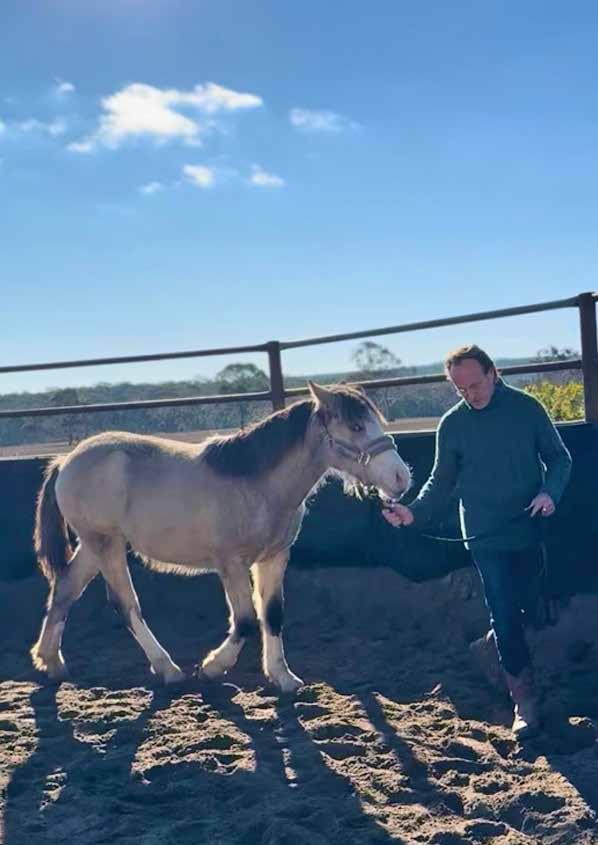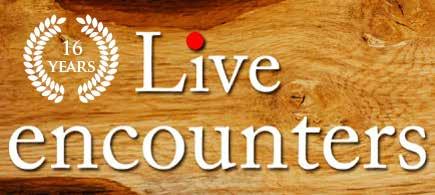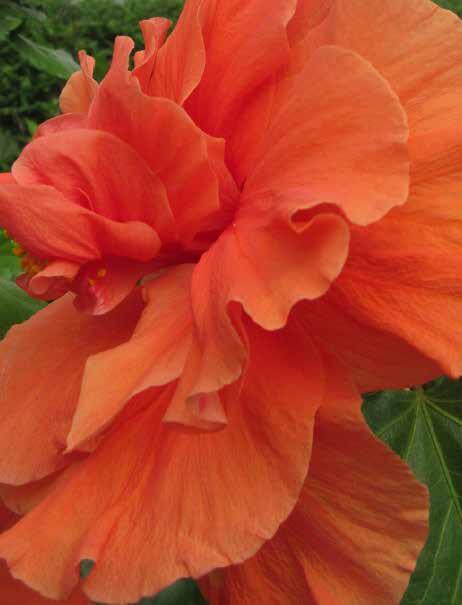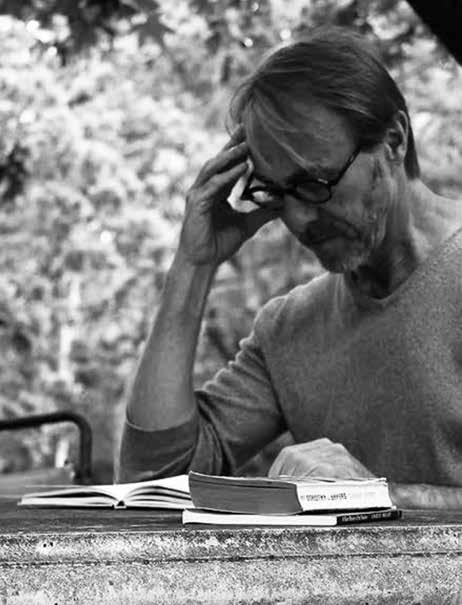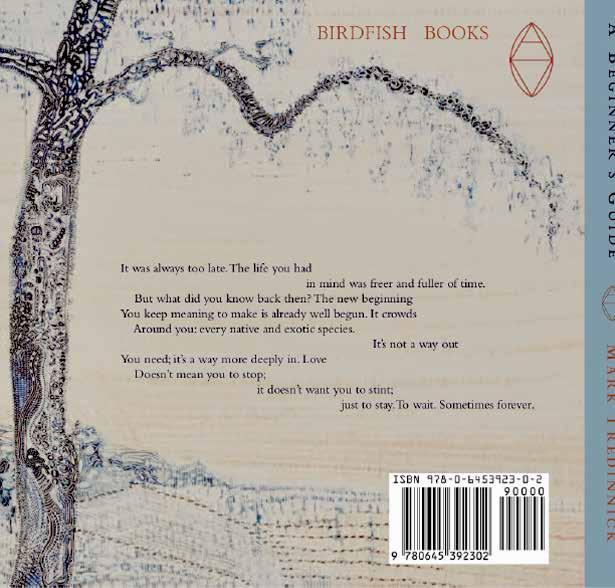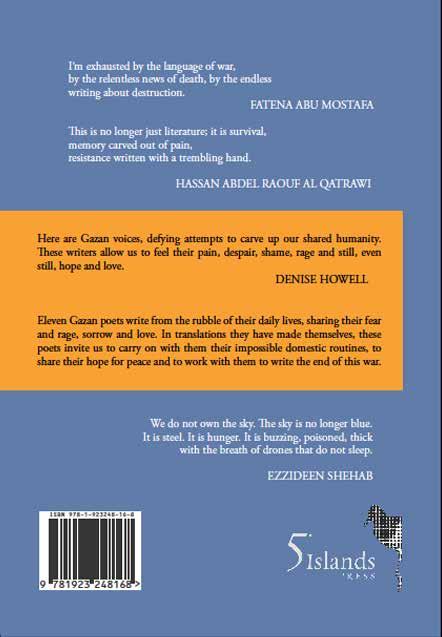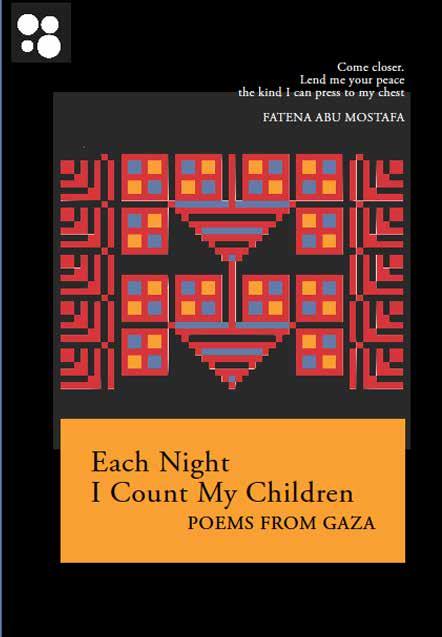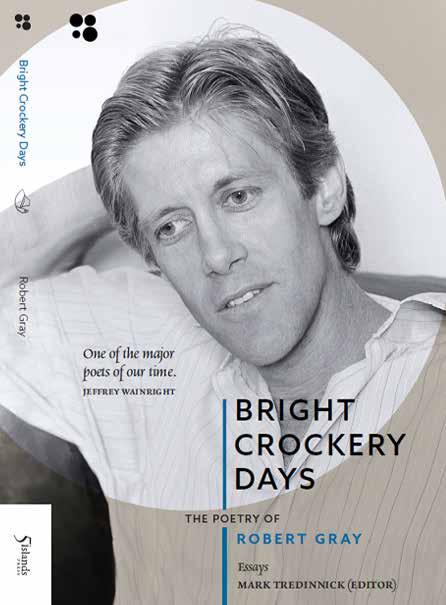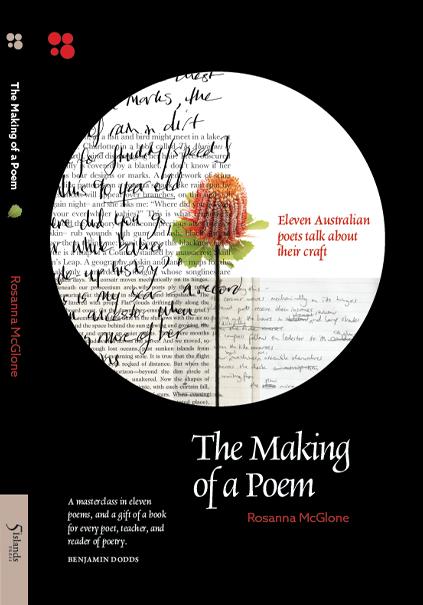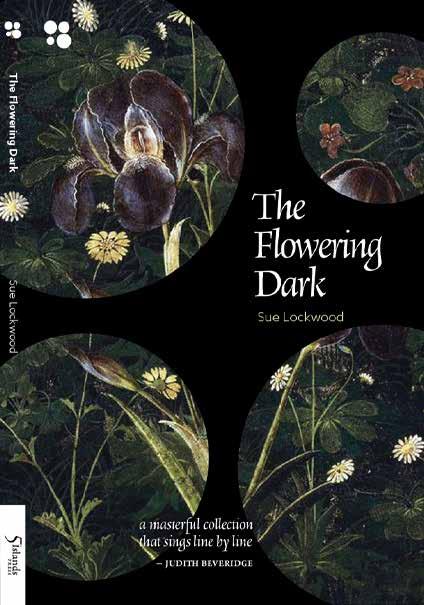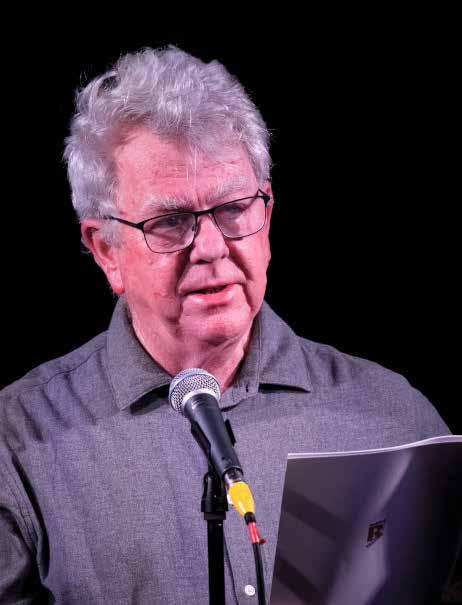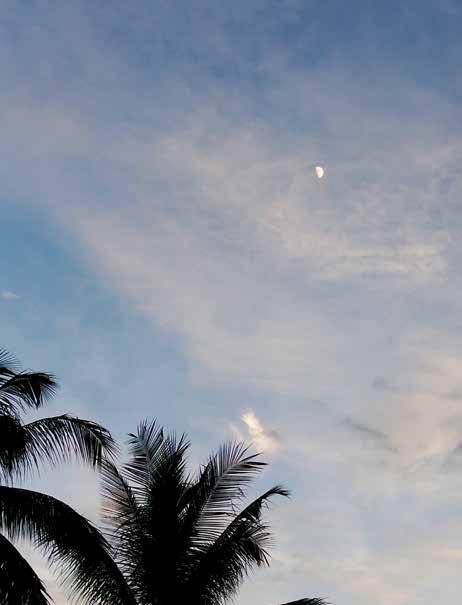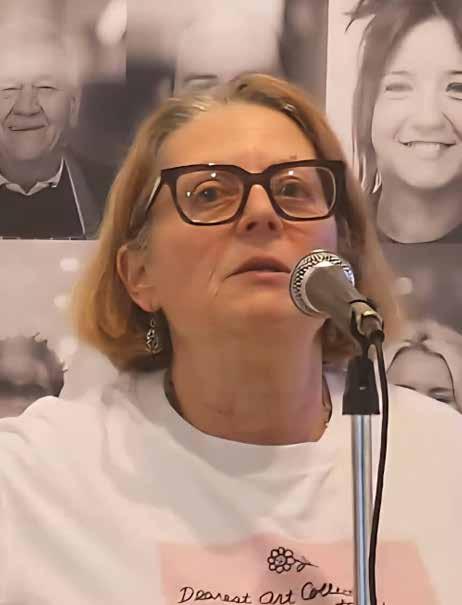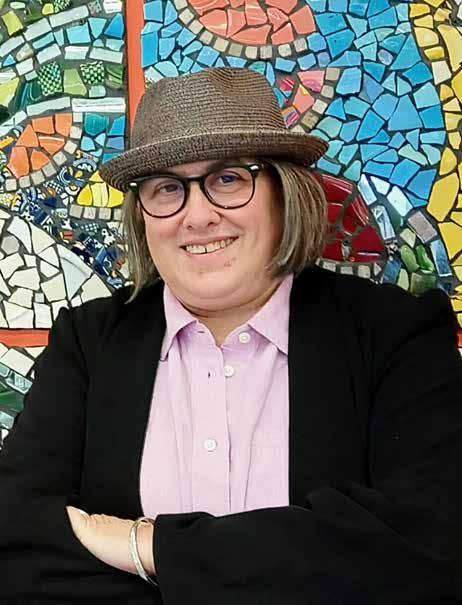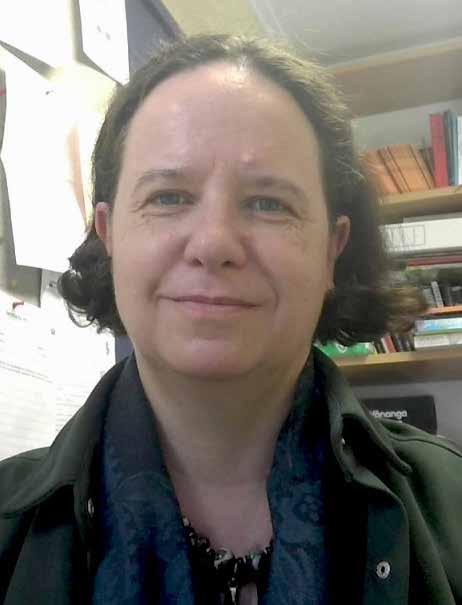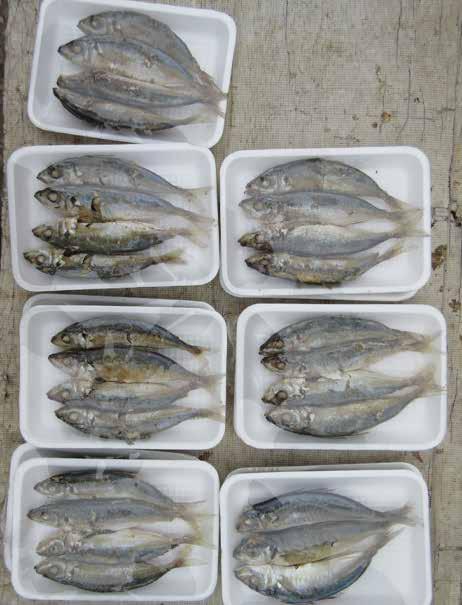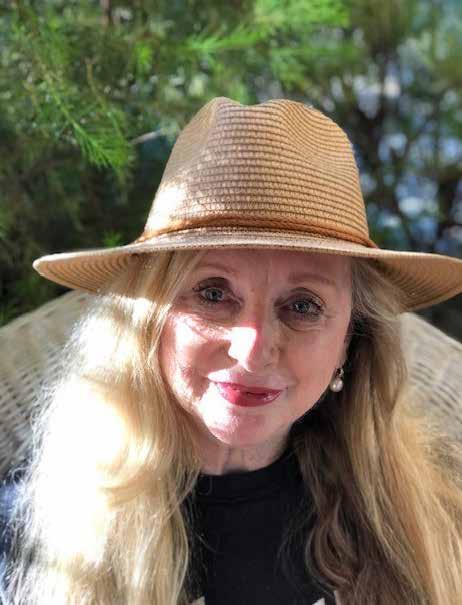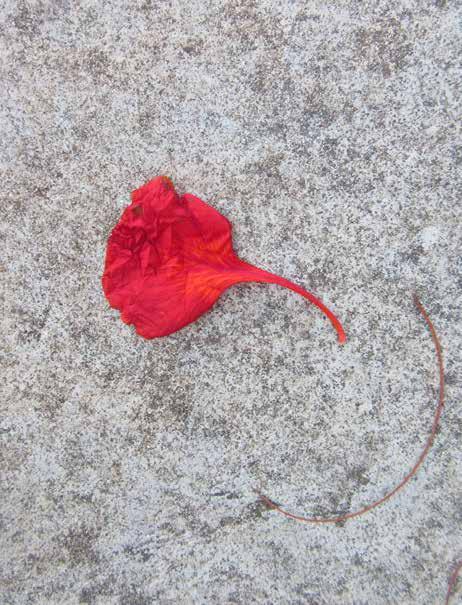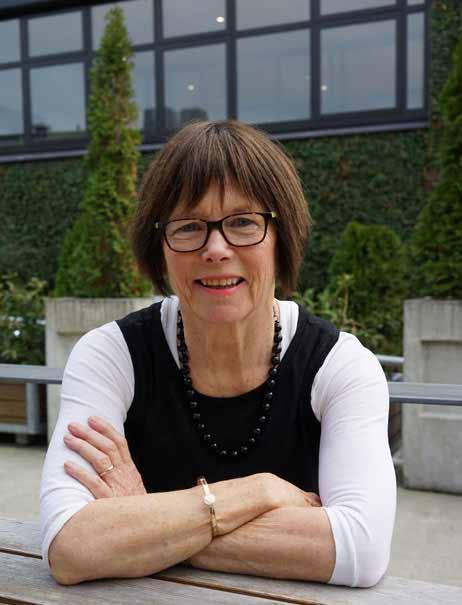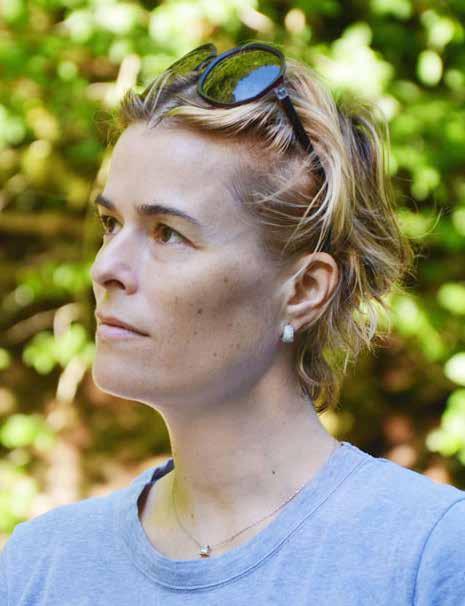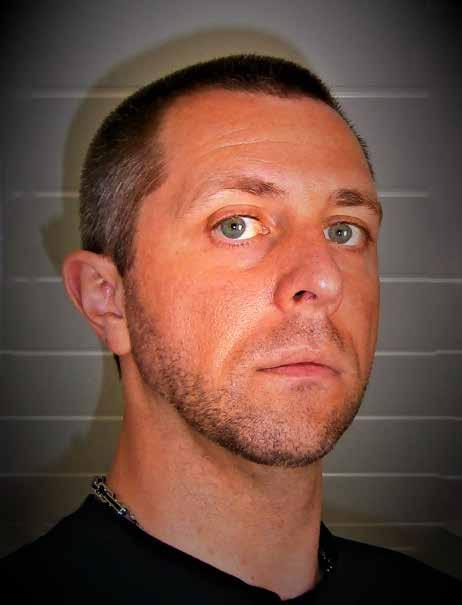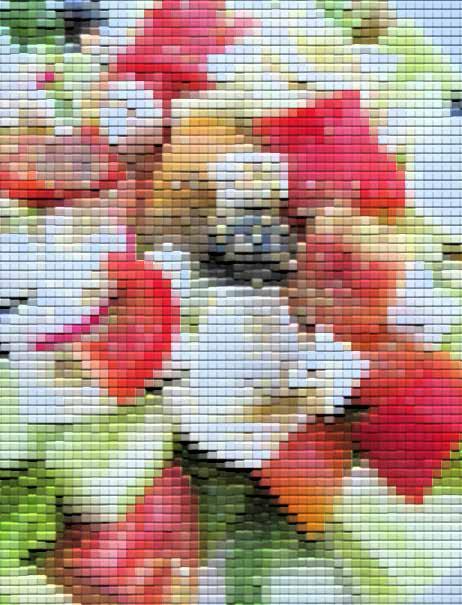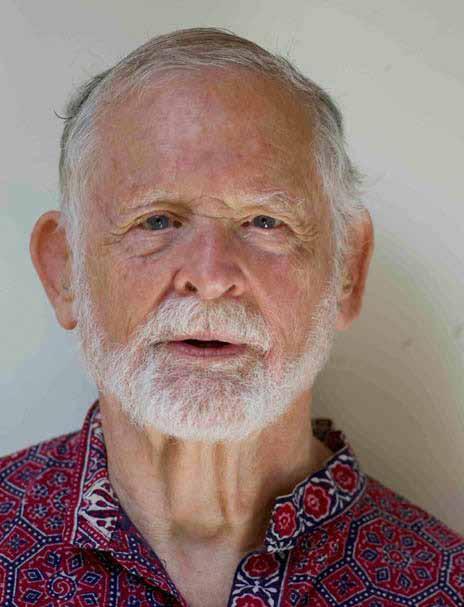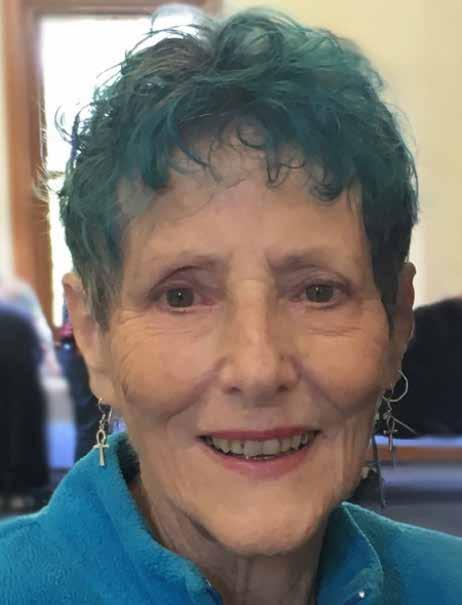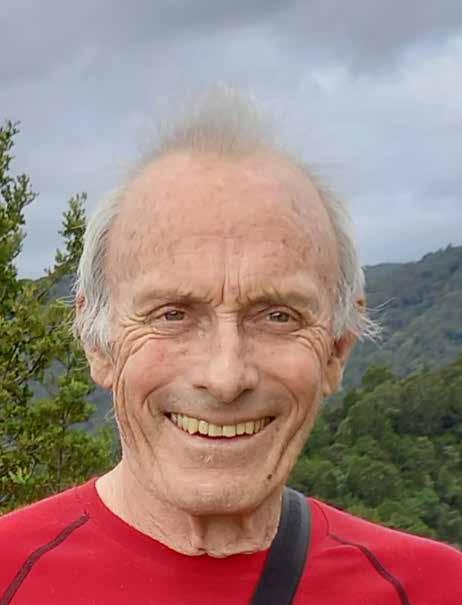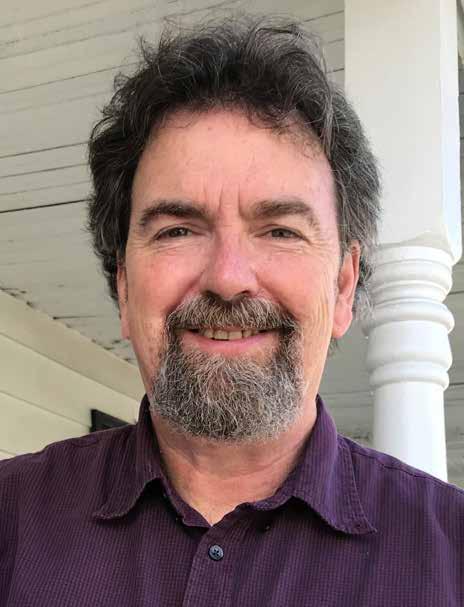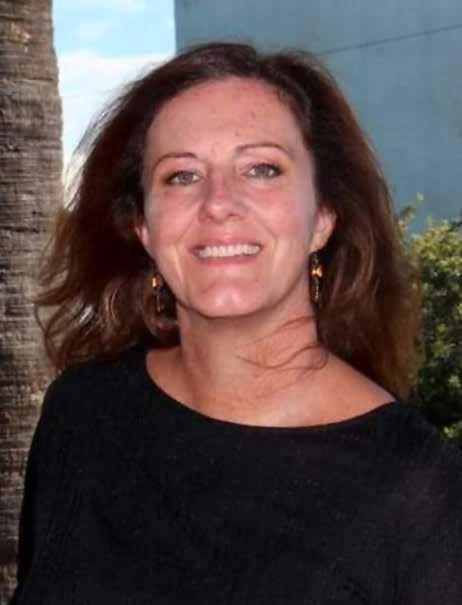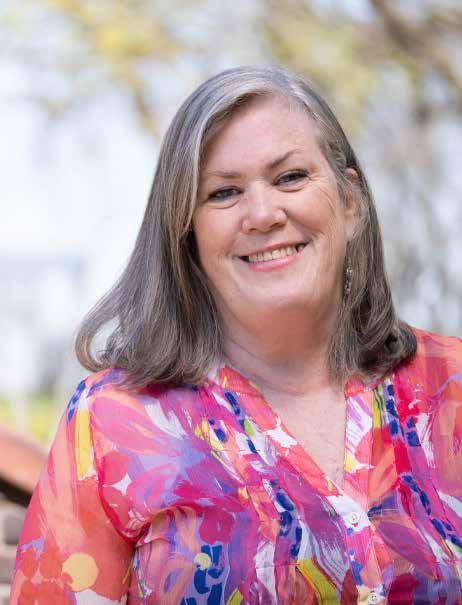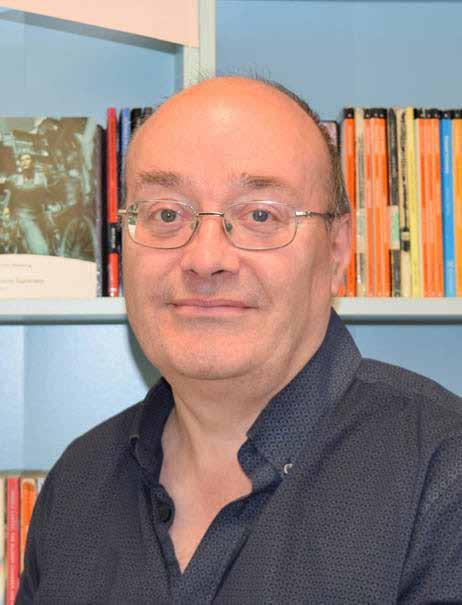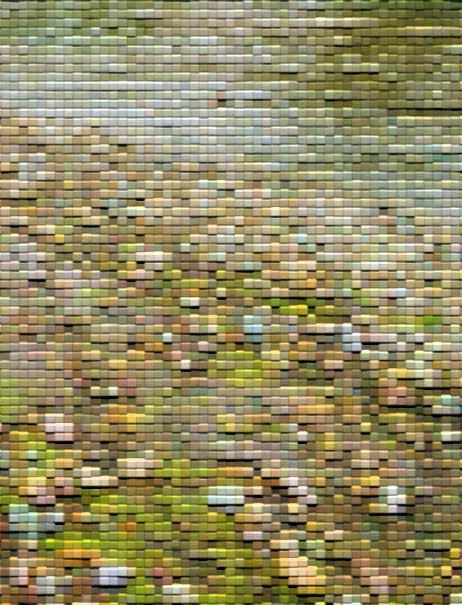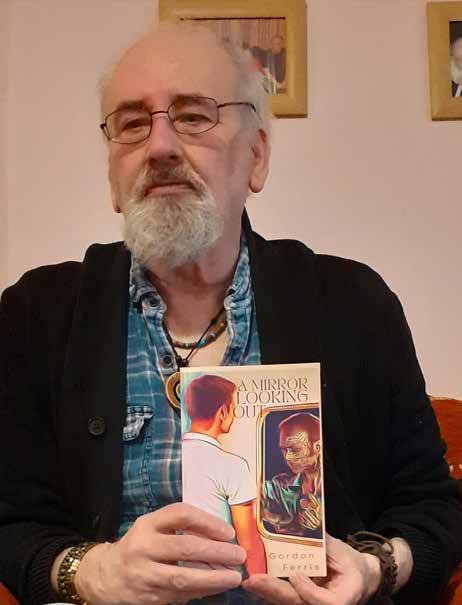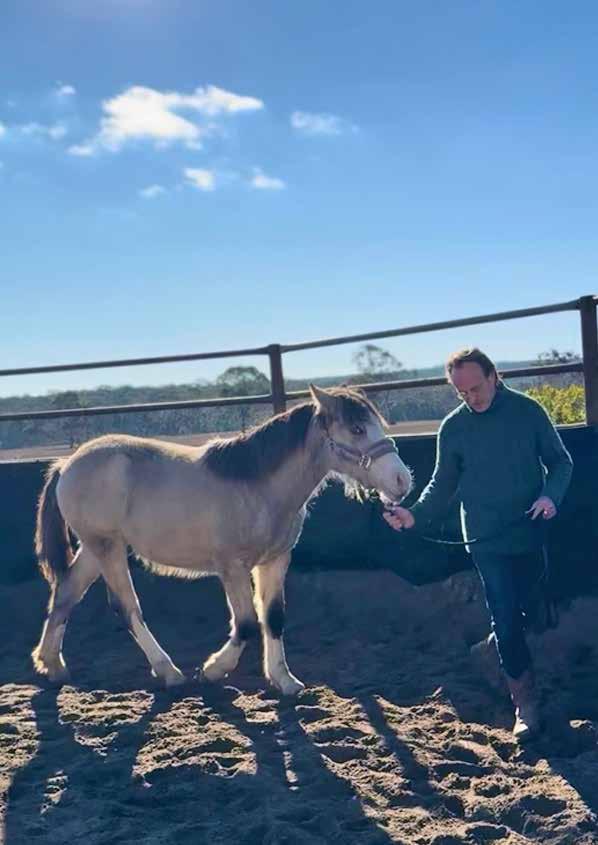Mark Tredinnick First, Do No Harm War and Peace and Poetry
In a time of destruction, create something. A poem. A parade. A school. A vow. A moral principle. One peaceful moment.
—Maxine Hong Kingston
The Clangorous Mechanics of What’s Real
Up in the northwest provinces of the great sandstone plateau we call the Blue Mountains, in southeastern Australia, a valley is cut by a small river that rises in the outlying ridges of the plateau, at Bogee, near Rylstone, and it flows, unaccountably (to me) eastward, into the bulwark of the plateau, to join the Wolgan and with that river make the Colo, which joins the HawkesburyNepean, and, at last, they all find the sea. Just a bit to the north, and still in the stone country, the Cudgegong, another small river, which goes on to water Mudgee and to fill a couple of dams, rises to the east of the small river I’m sitting near, in its handsome valley, and yet the Cudgegong, though it starts further east, flows west— away from the plateau and the coast, and on into the hungry belly of the continent.
Few things in a human life or the life of the world or of a place run as simply as you’d imagine. The divide that runs a great crescent down the east coast of Australia, from Cape York to Gariwerd (the Grampians) and sorts the waters east and west of it, is made up of a thousand small and fractious ranges that find themselves tending somewhat unwillingly to cohere, and the notional divide from which the rivers flow either inland or down to the Pacific is as sketchy and erratic as all hell. As witnessed here at Glen Alice in the Capertee, where I am this late October among a profundity of birds and blowflies, wide pale pastures, and all these encompassing scarps, these handsome purple, ochre, grey assemblages. We’re here for a wedding anniversary (our first), and as I put it yesterday in a poem, a gift to my beloved:
The house sits at the head of the valley, where the river slips into the plateau (under the gate of the garden of stone), and the winds are chronic here, petulant as parrots, crazed as blowflies.
And all the long blue day the wrens run overdue repairs on the clangorous mechanics of what’s real. The river gets on with composing the present from the past, and the sheoaks walk all sorrow back the hard way to the east.
The work of making poetry is hard: a poem of four stanzas took me most of a day to discover and lay out and tend yesterday. But the work it performs is like that of the lean Capertee river, whose (present) course I can make out from the house, marked by the sheoaks, carrying the sadness and loss and desire and death and birdsong and grief articulated and recollected in the valley, into the apparently impenetrable walls that confront it.
The work of poetry is soft and indefatigable. It insists on itself and on eternity and on what is real, all that it witnesses in human lives and hearts and in the greater world those lives of all beings participate in; it insists on itself and on us against an imponderable weight of indifference; it prevails, poetry, like this small river, against impossible odds. Poetry is the water that, improbably, wears away the stone.
And so, I think, it must be. The world knows enough vainglorious, strident, and violent ways of making a point. The power of poetry is to eschew those paths, and so to say and do what otherwise cannot be said and done.
And the River Goes On
As I write that last paragraph, the wrens in their workshops inside the roses out the back give over to the chita chitas, notorious prophets of endings and beginnings, and then, as if to laugh me out of my quiet pieties, two little friarbirds (google them) overly the house brawling their hysterical plaints. Poetry should be hilarious and outspoken and even a little histrionic, sometimes, too. But its real work begins when the outcry subsides. And the river goes on.
The Drunkenness of Things Being Various
Here with me to read in the valley I have a selection of the poetry of Louis MacNeice, a selection for Faber made by Auden. “I didn’t think anyone was still reading MacNeice,” one of my students said to me recently, as if it were a reading list—somehow compulsory and drafted by whom and on whose authority?!—from which poets are periodically eliminated. There is only poetry. When it is well made it is, again, like the river, here, going on doing its work regardless of who cares to pay it any attention or attribute to it any value. MacNeice was not, perhaps, one of the great poets T S Eliot has in mind in some remarks I’ll get to in a moment. But then, who is? And who decides? But because, I think, MacNeice’s work was (and is) steeped so deep in craft and care for the human condition, less persuaded by some by the arguments of fashion, some of his work endures and is capable, movingly, of speaking truths about one’s own life and times, not just his.
Plus, as it happens, MacNeice’s time, which might have seemed to have passed, is here again. His star is rising. It sometimes happens. It happened to Bach, after seventy years lost to us all. Never trust fashion, I’d say.
Auden apologises in his short introduction for leaving so many poems out and for his lack of all authority except his likes and dislikes for making the choices he has. He also explains that MacNeice went through a long dull patch for a decade or so.
continued overleaf...
A Beginner’s Guide - book availabe at https://www.marktredinnick.com/books

And don’t we all. But the selection is still large and some fine poems made the cut: wonderful and wise “Sunlight in the Garden” and parts of the long poem sequence, “Autumn Journal,” in which the poet innovated free-verse and prose-poetic forms to establish a looser kind of structure for the sustained and grounded contemplations of love and ageing and place that he writes there. It’s clear what the poet stands against (cant) and for (beauty and honest and dignity and love and place. There was a lot to be anxious and angry about during MacNeice’s writing years: the threat of fascism, the threat of communism, the unbreathable air of London, the threat of nuclear extinction, the moral tightness of the times. But MacNeice knows that poetry’s part in the great work of resistance is the small work—the noticing how the big ideas that dominate a time play in everyday lives like of his own and in everyday moments. Like the sunlight on the garden in the poem that observes it: a poem of hope and despair, at both public and private loss, a quiet observation of the persistent beauty of things, notwithstanding ill winds.
It is only with the great poets, perhaps, that the language of the poet escapes the privacy of her idiolect and interiority and transcends the habits of mind and speech that characterised her times. More on this proposition (Eliot’s) in a bit, but just to say there are, for me, a few too many occasions where I trip up in MacNeice’s utterance and wish he had found the courage to be plainer or worked out how to shake a personal or temporal habit unlikely to help the poem survive its moment. (In such moments one hears but barely comprehends the speaker, and one is shut out a little from the moment of Being that had seemed, till then, one’s own, all of ours.) Even in the poem “Snow,” which I love, I meet a little unhelpful opacity. But then there are these lines— lines as radically clear and hilarious and serious and important now as then, as vital for us to understand as readers and voters and writers now as these lines always were: for it is true, I think, that prevailing discourse (political, intellectual, artistic and private) tends to bifurcate and enmify and oversimplify or overcomplicate and to strip lived experience of its layers and contradictions and eros and dynamism.
World is suddener than we fancy it.
World is crazier and more of it than we think, Incorrigibly plural. I peel and portion
A tangerine and spit the pips and feel
The drunkenness of things being various.
Poetry’s Innate Activism: Bearing Implacable and Memorable Witness
Please let us—in our languaging (as in his) and in our understandings of how humans are and how relationships play and what things mean—recall and practise the incorrigible plurality of things, the drunkenness of their and our own being various. Let’s leave the platitudes and stereotypes and categories to AI. Let’s leave the mantras and slogans and tribalism to commerce and politics. Poetry’s activism is performed by its bearing implacable and memorable witness to the real, in language that does deep justice to what it witnesses—place, moment, person, cause. Good poetry keeps doing that justice long after the news cycle has moved on; its justice lasts, transcending as it does the particulars of the times it witnesses., Poems work in time, but also in eternity. Writing poems is for finding, through care with language, one’s own unique range of variousness and for divining one’s own plurality (for coming back plural, as Rumi put it once), and for making common cause—through language as awake as this head of the valley is with layers of being, past and present—with the issues and moments and instantiations of the moving world, as the world manifests in given faces and places and beings and schemes. Poetry is for joining the wide world of Being It is for perpetuating the uncanny and beautiful, and sometimes unbearable, variousness of things, catching them in the act of getting after their living, each of them refusing, notwithstanding all that is hard and wrong, not to Be.
Toward a Poetry of Peace
All is not right with the world.
It never is, but things right now, in many arenas, are unhappy and dangerous, terrifying and ugly. Mobsters broker what they like to call peace; the idea of the public good, the common good, has flown from minds both left and right; kindness and forgiveness and generosity are vanishing from heart and mind and mouth; the oceans warm and the plastics swill and the forests fail and the cities burn; loneliness is pandemic; civil disagreement, on which democracy depends, has largely descended into shrillness and name-calling, a mutually assured destruction by competing outrage; all our thoughts are thought for us and all our phrases fashioned by bots using stolen IP; ignorance informed only by internet rage gets despots elected, most of whose work, as ever with despots, is vengeance and rank ideology and the further enrichment of the rich.
continued overleaf...
It is easy to despair, but one must not, or all that isn’t right prevails.
What might be the role of poetry in times of such trouble and injustice? Not, I’m certain, to engage in the devices and postures of prevailing politics: the anger, the name-calling, the categories of blame and cancellation, the tribalism. In order to save us from the politics that prevail—and not only among politicians—poetry, I believe, must practise, in its rhetoric, its diction, its devices, and what it chooses to speak of, the values of dignity and compassion, tolerance and mercy and peace and courage and grace and civility that are so missing from the hegemonic discourses that rule our institutions of government and law-enforcement, of public policy and education. Remember Heaney, who had to fight hard for what it took to know the truth of what he said in accepting the Nobel Prize: poetry, uniquely, caters for two contradictory needs of the human spirit in times of trauma—not only a retributive, profoundly honest truth-telling, but also, a softness of seeing and saying, without which the traumatised soul, though their suffering be names, is still lost and without love.
Let us not forget to love: the world, in its woundedness; each other, and yes, even our enemy. Poetry is the way love speaks: tough love, soft love, the slim and persistent stream that defeats, in the end all resistance.
Poetry’s work is to keep us from despair, to call us to turn our pain and anger into something more useful. Poetry refuses to accept or to allow us to accept what the politics of greed and envy and revenge ask us to accept as real. Poetry’s politics is its refusal of the idiom of politics—its vow not to act and think and speak the way that tribal politics, sects, and ideologues do. Its work is to make us always more human than we are told we are. To love us in our frailty and magnificence and to ask us to be kinder and to be more useful to each other.
Softer Bombs
How a poet might respond to what Israel, for instance, with Western weapons, has done to Gaza: here is one of the great moral challenges of our moment. And in one sense, the response is easy. Anyone inclined to read and write poetry will contemn the murderousness, the depravity, the vengefulness, the asymmetry, the barbarism of the occupation and destruction (just as the bloodthirsty violence of Hamas, which, rising though it did from years of occupation of Palestine by Israel, triggered the monstrous and disastrous Israeli response).
But how to make one’s words useful to anyone, especially anyone under the bombardment, or to anyone making decisions that might bring an end to the killing. That is the real question. Poems of shrillness and (understandable) anger have prevailed, but it’s not clear how much they help anyone except as a catharsis for the speaker. It is too easy to write a poetry violent and intolerant in its attitudes and language. But no one needs more violence. Entrenched tribalism is the problem here; enmification on the page perpetuates war; it heals nothing and no one.
A fine young Gazan poet, Fatena Abu Mostafa, puts it this way in one of the poems gathered into an anthology by Denise Howell, Each Night I Count My Children: Poems from Gaza, a book we’re proud to have just published at 5 Islands Press:
I’m exhausted by the language of war, By the relentless news of death, by the endless Writing about destruction … Come closer.
Lend me your peace— The kind I can press to my chest.
There is poetry’s work, spoken of by one under the bombs, one whose poems speak the language of peace even though there’s a lot of war in them. There is our work, I think. There is the politics of the poem. To let us feel, in our selves, what the war is and what the dying and the suffering are and to insist on more from ourselves and our friends and leaders. The work of peace is poetry’s work.
All That War is Not: How to Write Poems of Use in Times of Violence
For poetry refuses and softly refutes the violence of dehumanising discourses: war, fundamentalist ideology, absolutist politics, the words with which one tribe, in any context, steals humanity and variousness from the other. That is its politics, and it happens to our hearts. Poetry does not enmify; it takes life’s side; it knows no idiom of revenge.
continued overleaf...
Book availabe at https://www.marktredinnick.com/books
Poetry over the centuries has borne witness to what being feels like and what it may mean to live a finite life in an infinite universe, especially when the living is hard: as it is for the poets in this book, women and men and children carrying on under unrelenting siege in Gaza. Poetry restores dignity to death and sorrow and bitterness and abjection, to hope and survival and daily bread and to carrying on notwithstanding. It divines what is human, and therefore sacred, in moments particular to those who suffer (or are blessed by) them, and it invites us (readers) to know those moments as our own.
Good poems implicate their readers; in a sense, they turn the reader into their subject. This is the work of metaphor and speech music and form. The deeper speaking of poetry.
From often unbearable, chaotic, ecstatic or unimaginably awful eventualities, from suffering and privation, poetry fashions—in the voices of those who survive those moments—habitable forms, beautiful coherences, in which hope is possible again and violence falls well short of its aim. A poem is a soft bomb. A small incendiary device, a poem goes off and doesn’t stop; but its work, unlike the bombs raining on Gaza, is to give life, not to take it, to dismantle ignorance and unsettle apathy, to transfigure rage into something more useful, to practise and engender compassion, to implicate the reader in both the cause of the trouble (or delight) and in its consequence and in the possible futures the poem helps us imagine.
A good poem, like all the remarkable pieces we included in the book Each Night I Count my Children, recruits the reader to help “write the ending” of this and every war.
Wars pursue and depend upon ideological abstractions (ideas about victory and homeland and enemy and patriotism and vengeance and so forth); they cheapen life in order to take it and to make that okay. Poetry should be all that war is not—innately human, relational, particular, contradictory, various and generative. A poem is not just a bullet; it is a mother and a father and a hearth and something unendurable to endure. It is despair seen off and tyranny stared down. It is a voice that loves life, even when it condemns those who take it.
The poems we were proud to publish in Each Night are partisan for peace and for life and for mothers and fathers and children. For hope and home. Even if you forget the circumstances under which they’re written, they are remarkable instances of poetry’s peace-making work, its soul-making, heart-breaking, mind-altering work: the way it has kept humanity (each of us and all of us) sane, made sense of senselessness, taught readers to find their own selves in the faces of the enemy (and the enemy’s victim), to love better for being implicated in both the violence and the resilience.
These poems count their children, name their dead, remember the sky and the ramshackle city by the sea; they feed the cats, laugh at calamity, despair and keep going; they give in and cry out and find a way to wake again and refuse to fall silent. They throw soft bombs. They restart the revolution in the heart, which does, in the end, write the end of war.
A poem cannot stop a war; a book of poems won’t bring about a peace. But still a book of peaceable poems can save lives by telling them and honouring them and those like them (many of them already lost), and it can help a beleaguered community by moving readers in a position to help, to help. Apart from reaching the readers Denise’s book has already and reached, the book, through her generosity and that of my colleagues at the press, who gave their time for nothing and donate all takings to the work of MSB in Gaza, will be of some practical use. As all poems should, I reckon, try to be.
First, Do No Harm
Doctors, before they practise, take the Hippocratic Oath. First, do no harm: this is that oath, or the heart of it. Hippocrates ( c.460–370 BC), to whom the oath is attributed, was a physician and philosopher from Kos, and although it is from his writings and that of the school of Epidemics he founded that the oath came, his words do not anywhere quite say “first, do no harm.” They say “I will abstain from all intentional wrong-doing and harm.” And they say “Practise two things in your dealings with disease: either help or do not harm the patient.” But the idea is the same: the primacy of refraining from harm in offering help—in meeting the medical needs of those you serve.
continued overleaf...
And so over time, in the Latin phrase “primum non nocere,” and in the English “first, do no harm” settled into popular usage, though not in so many words, among medical practitioners (The world rarely runs exactly or as simply as it seems.) It is a form of words that all of us, even poets, know, but few of us, especially poets, pay enough attention to in our work.
Clearly the oath is not a promise that no patient should ever feel pain; the central idea, vital to the humanity of the practise of medical care, is that nothing the doctor does should be done for any reason other than to heal, to help the patient with their need. Something a doctor does, a surgery for instance, may hurt, but it must always aim to heal.
Interestingly, other versions of the oath doctors take remind the doctor that they treat a whole human (and indeed their family) and that the soft skills of the physician, like kindness and honesty and attention and the gentleness of the doctor’s speech and action, matter as much as scientific considerations in the practise of care. Not to play God, and not always to presume to have the answers.
Now, poetry has been important to all the human cultures we know of, and poetry has been associated in most, if not all, of them with healing work: it is for soul-making, said Keats; it is for survival, wrote Orr. There is no question readers have through the ages turned to poetry to find themselves accompanied in their pain or ecstasy and to help them make sense of the incomprehensible, to find a way through difficulties of the hearth and the mind and spirit.
So, if there were still, as I hope there is, a shared understanding that poetry ought to be spiritually or psychologically useful, even healing in some way—to make (and for the reader to find) in words a habitable coherence where before there was just trauma or a chaos of emotion—then the poet might want to take seriously the work she or her makes, the medicine they offer to the world. In which case it is worth asking what an oath like “first, do no harm” might look like for a poet, and whether it might help us find our readers, and help them, again.
If a poet were asked to take an equivalent of the Hippocratic oath before making a poem, it might, I reckon, have these dimensions.
• First, to help. Not just to voice, but to meet human needs for language that heals and elevates our understanding of being alive in a troubled world; that makes readers kinder and braver and less afraid and less full of ourselves.
• Also to cause no harm to language or person, while throwing light or bearing witness or consoling grief, or giving delight, or recasting the spell (as Emily Dickinson put it), or however it is one thinks one’s words might help (the language, the world, the imagined reader, the general stock of wisdom, the moral clarity of one’s times.
• To treat, as it were, the wholeness of the person (the reader), not just her intellect or his politics or their sociological or anthropological or cultural category, but their being, their incorrigible variousness, their drunkenness of variousness.
• To arise from one’s whole self, at one’s best and fullest, not merely in one’s professional life or social category. To write, as Montaigne once put it, as “all that I am.” Out of one’s flawed and mysterious and various humanity.
• Not to play god: never to be too certain of one’s observations or categories or mantras or prescriptions, one’s understanding of who is victim and who is perpetrator, of who is right and who is wrong. To be aware of the terrible complexity of things, and yet to be clear in one’s values, partisan always for justice. Poetry, after all, forgives us for being human, and finds us all both culpable and innocent and in need of some care.
• To honour the obligations a poet owes, not just to their own people and readers, but to the future and the past, and in particular to the great long tradition of the making and sharing and private reading of poetry, the deep importance of that tradition to the wellbeing of human societies and to individuals in those societies. This is not just diverting hobby, in other words; nor is it a microphone and a mobile phone and a chance to hurl curses and opprobium at the bad and the ugly; poetry is a gift given to you to put to work for others, to rekindle the revolution in their heart).
continued overleaf...
T S Eliot, Dante, and the Poet as a Servant of Language (and its Readers)
Asked to make a lecture on Dante, Eliot wrote an essay, instead, that walks around the ways The Divine Comedy and its poet had touched and influenced him—in life and in letters. Such is my affection for the great Italian poet, we named a dog for him: Dante, the golden cocker spaniel, for whom the straight way was always lost. Jodie and I read our way through Dante during COVID, sharing the Italian in our best imitation of how it might have sounded, and moving between Sinclair’s prose and Sayers’s metrical poetic translation, and checking also, when her meter got in the way, more recent translations that attempt to catch the poetry but not to imitate all the poetics, and that time in our lives, though the going is not always easy and the divinity not always all that comedic, will remain one of the times of our lives.
Because this short trip to the Capertee is a celebration of our first wedding anniversary, Jodie brought with her the book in which Eliot’s essay “What Dante Means to Me” appears, and two days ago she read it aloud over breakfast. In her voice was Eliot’s voice and inside his, Dante’s old Italian, and here and there some Shelley. Or not their voices, but the music of their intelligence and craft and the humanity they witnessed.
I can’t claim to be either as steeped in Dante as Eliot was or as deeply influenced by him, though it stays with you, that musical intelligence, that imagery, the humour and the rhythm of the wisdom. I’m with Eliot when he writes that there are some poets, he calls the masters, “to whom one slowly grows up.” I’d tried Dante a few times in my thirties and forties, but I think I was only ready for him, in my reading and craft and in my living, in my fifties. Eliot was largely wasted on me at school, too; I’d grown into him by thirty-three, and largely out of him by fifty, but his ideas—the objective correlative, the power or rhythm, individual talent and the poetic tradition—stick with me.
And so it is that Eliot’s three conclusions about Dante feel like better ways of saying things I have been teaching and preaching and trying to practise for over fifty years. I have no doubt that, like Sappho and Dickinson and Shakespeare and Auden and Rumi and others it is perhaps to early to be sure about, Dante was as masterly a thinker and world-builder and, above all, an artist of the line as anyone ever.
Available at https://www.5islandspress.com/product-page/bright-crockery-days
continued overleaf...
It may be, as Eliot says, that though many poets are wonderful, and we need every one of them, but only a few are great. And to the great artists (Hannah Arendt says the same of Auden, by the way) Eliot attributes three particular qualities. I’m not sure it helps much these days to speak of masters and others. Certainly, though, the qualities Eliot touches on in Dante would be useful for all of us who write to work at.
And it seems to me we’d win our readership back and show the world how useful and necessary poetry can be, if we valued and attempt to practise these values and skills.
1. “The great master of language,” writes Eliot of Dante, “should be the great servant of it.” Through sustained attention to one’s craft and to one’s language, the great poets do, writes Eliot, and the rest of us should, use the language, whichever is ours, in its fullness, to serve it by stretching and renewing it—but not mostly by innovation or personal eccentricity, by ignoring its ways or subverting or abusing it. The language we write in comes to us as a great gift, I’ve often thought, and we ought to earn that gift, that privilege, by the love and care with which we employ it, by adapting ourselves to it as much as it to us, by fitting it thoughtfully to our times and the needs of our readers in our times. Let’s aim, in other words, not to fuck language up in the service of our ambitions, but to leave it at least as rich and wide and fine as we found it. First, in other words, let’s do no harm, and beyond that, to do some good to the language and somehow ennoble it and enable it to reach out in its native wealth to more readers than would have been the case without us, so that the language, as it finds our readers through our poems, to do some radical good.
“To pass to posterity one’s own language,” Eliot says, “more highly developed, more refined, and more precise than it was before one wrote it, that is the highest possible achievement of the poet as poet.”
2. The poet, Eliot would say the great poet, has the gift, or develops the art through practices of inward and outward attention of wider and deeper and more discerning apprehension of the phenomena in which the world plays out and one’s own life and the lives of others play out in it, experience existence in its many forms and colours.
The poet notices more shades and “vibrations,” as Eliot puts it, of lived experience. And the poet will be good or great to the extent that they have the natural gift—or train themselves by apprenticeship, reading and practice—of finding within the language to which they have access ways of saying that do justice to that wider range of perception and deep and more subtle range of thought that is the core practice of the poet.
And so, as Eliot notes, the first gift or genius (linguistic accomplishment, craft, the practised mastery of the language in its semantic and lyric, figurative and musical realms) serves the second (seeing and feeling and thinking more fully). So the poet who would write some poems of use will see deeper into how life plays out, into the heart of the “incomprehensible” or mysterious or mystifying or terrifying or ecstatic, and they will offer a response to the plurality of what they apprehend, that in its sheer adequacy, in its mastery of language and poetics, serves its material more faithfully and invites a reader more fully into a comprehension of the incomprehensible, into an experience deeper than they had known they could have, or into an understanding of a phenomenon of living that a reader had known but hardly understood—and now does.
One of the ways good poetry serves us all is to expand the emotional, phenomenological range and literacy of those who read it, and of the cultures, at large, in which that poetry finds its place. This, it seems to me, has been the work—help with allowing us more fully and usefully and safely to feel and know and survive sanely the kinds of trouble and delight every life bumps into—that poetry has performed through the ages. And it is the work readers expect it to do. So, when much of the poetry readers encounter fails either to notice profoundly or speak of what it meets with well (remarkably, but clearly), to speak of it, even half to sing of it, not merely to think or rage about it—they lose their faith in poetry.
3. Dante, Eliot observes, writes from where and who he is—his times, his place, his language, his culture, his nature—but somehow, at the same time, he speaks about and speaks to all times and all places and all languages and creeds and genders and ways of being. Dante is, Eliot intones, the least provincial of poets, but “he did not become the least provincial by ceasing to be local.” The Irish poet Patrick Kavanagh wrote that the parish was the proper province of the poem. “To know fully even one field or land is a lifetime’s experience,” he wrote. He understood the parish not as place or worldview that shut out or denied the world, but as an “aperture” through which, alone, the world might be seen and known and named. Depth, he wrote, not width, is the work of the poem.
Eliot does not spend much time on this point in his published talk; perhaps he ran out of time. But I would say that the trick here is to know your moment as an instance of all such moments, this war and suffering as instances of all such traumas, your place as one incarnation of the world, not as if it were the world, let alone the best or worst place in it.
continued overleaf...
Available at: https://www.5islandspress.com/product-page/the-making-of-a-poem
History, the poet understands, is made of moments such as these, and she writes in that knowledge, offering up the world near at hand, the bird, the love affair, the loss, as an instance of all such phenomena everywhere and any time. Dante, for Eliot, and it felt like that to me reading the Commedia, has that knack. All that Dante’s poet encounters in hell and purgatory and paradise, though peculiar to times and ways now lost on us, seems spoken in one’s own voice and seems to happen to oneself— now, in whatever analogous circumstances one finds oneself in. There will always be lessons in a good poem for the times and troubles the reader lives in, far away though she is in time and place, from the time and place the poem witnesses. The good poet knows that it is not herself she writes, but all such selves, ever, and anywhere.
How the Poets Have Run Themselves Out of Town and How They Might Run Themselves Back in Again
We find ourselves in times that need poetry more than they know. And just when it is needed most, poetry, for most of the people who need it, is hard to find and harder yet to fathom or put to much use. For one thing, poetry plays much less central a role in most people’s lives than it used to—than it should. This is true especially across those parts of the world where English is the dominant language and where late-stage capitalism is in the ascendancy. By contrast, it struck me, reading the poems Denise Howell sent me to consider for the anthology—poems written by teachers and doctors and nurses and students and psychologists, by mothers and fathers, and in some cases “professional” poets—how much accomplishment in craft and perception and articulation were on display, suggestive of people more steeped in a long tradition of poetry than is true of most of us who speak our lives in contemporary English, most of the people, including book-lovers and teachers and students, that I encounter in my native land.
I don’t want, here, to rehearse the many reasons for poetry’s flight from the centre of our values and days. Some of the reasons are what the economists call exogenous, beyond readers’ and poets’ control (the radio, popular music, the internet, aesthetic theories that forgot to take readers along with them, television, the ascendancy of film ...). But we poets who mourn our falling sales, the absence or the slenderness of poetry sections in most bookshops, the lack of media attention to poetry, the lack of poetry literacy, would do well to look at ourselves and the practice of our art.
This, too, is a big story, but since the dawn of modernism, the coming of free verse, the rejection of form (of meter and speech music and rhythm structures and often, too, the rejection of punctuation and syntax, the refusal to make sense), the story of poetry is its turning from its readers; it is the story of its refusal of the role it has played and plays still in many cultures—the making of memorable sense of mystery and tragedy and delight, of being of some use. The story of twentieth and twenty-first century poetry in the west is two divorces: from its readers and their needs (for clarity and delight, the work of lyric sense-making poems from the dawn of human languages have fulfilled), and from language and its service, at its best, of our deepest human needs, as I’ve explored them here.
Poetry has largely in our times uncoupled itself, with the support of wave after wave of theory, from the tradition of (oracular, arresting, strange, memorable) sense-making by means of form and speech music and of patterns of syntax recognisable to most readers.
There are many exceptions, of course, many poets even in recent times, like Seamus Heaney, Mary Oliver, W H Auden, Judy Beveridge, Joy Harjo, David Brooks, who have kept the poet’s oath to language and readers and the healing of spiritual harm, through devices of language used at its most economical and stirring. But poetry has lost its readership, has lost the greater part of its market; its brand awareness, as the commercial people say, is fading, readers are out of touch and out of love with poetry, suspicious of it, and that is a tragedy. A tragedy very largely of poetry’s own making. This is not really something that has happened to poetry. Forgetting whom and what they serve, persuaded by one theory after another that has elevated thought over language, the idea over the utterance, the poet over the reader, the poets have run themselves out of town.
Time to find a way back in. Manifestly, no one can live long in a world from which the lyric has taken flight, where daily discourse is violent and stupid and brutal in ways that any good poem would sing right out of town.
Available at: https://www.5islandspress.com/product-page/the-flowering-dark-by-sue-lockwood
Mark Roberts
For much of the last four decades, Mark Roberts has been involved in writing, criticism and publishing. In 1982, he established P76 magazine in with Adam Aitken and has been involved in small press publishing ever since. In 2011 he set up the on-line journal Rochford Street Review, which is currently publishing Issue 42 https://rochfordstreetreview.com/
The Office of Literary Endeavours (5 Islands Press 2025) is Mark’s third book, after Stepping out of Line (Rochford Street Press 1986) and Concrete Flamingos, Island Press 2016.
Window
It has become something of a ritual. After I eat my dinner, tonight a plate of steamed vegetables from the garden just beyond the first hill, I stand and walk across the room to the large window facing the ocean. The light is fading and I can watch darkness fall across the water. Sometimes the waves are choppy and the sky full of clouds blocking the moon and stars and you have to strain to see the line of sky and water. Other times it is clear and the ocean is flat so that there is no movement but the sparkle of moonlight on the water.
Tonight, as I reach the window, there are still streaks of red and pink within the few wispy clouds that stretch towards the horizon. The sky is a dark blue and I know that over the coming minutes the last trace of colour will disappear. The brightest stars are already out and if I look slightly to the south I will see a group of of eleven stars twinkle into life. I know the old names of the constellations but, like most other things, I have renamed them. These stars I have called the ‘typewriter’ - there is a base of five stars, four stars form the keys and three stars form a rough line across the top. Some nights it is easier to see than others. Further south there is the ‘book’, to the north the ‘carrot’ and yet to rise is the ‘coffee pot’. When you look at the night sky for hours patterns continue to emerge and evolve, once all the stars formed together in a huge image of a beast about to swallow my apartment block.
I used to be able to stand at this window and watch ships, but it has been years now since I have seen one. They used to pass by all the time, two an hour, at night you could watch their lights move slowly up and down the coast. Then, about the time people started leaving the city, they became less frequent until, about two years ago, they ceased completely. It was as if each person was connected to one of the boats and when they left their boat no longer sailed past the city.
continued overleaf...
It was after Joseph, the old man who had once fixed violins for a living and who would occasionally still play late at night, the slow mournful music sinking into my dreams, left the city. That Monday night, walking home with my bucket of water from the well, I noticed that there was no candle light coming from his room. I climbed the stairs only to find his door open. Inside his breakfast still on the table, the coffee half drunk and cold, a hard boiled egg neatly sliced on a plate. I returned the next day and nothing had changed. By the third day I knew I was the last one left in the city. Eleven days later, at 10.38pm I saw the lights of a small ship heading north east. It took over two hours to disappear over the horizon. It was the last ship I have seen from this window.
I occasionally used to think I saw a ship’s light, but I they were always stars rising, emerging from the dark edge of the ocean. For a minute they hover on the edge of the horizon and, at first can be mistaken for the light on top of a ship’s mast, but they always kept rising and by now I know each star off by heart, the point at which it will rise from the ocean on a particular day of the year, what time it will rise and and how it will travel across the sky.
Now that I am completely alone the night sky has become a silent link to the rest of the world. I know that light from the stars has been travelling for years to reach my window - there, the light from the star in the bottom right of the ‘carrot’ has taken fifteen years to reach me, the light from the middle star of the roller on ‘the typewriter’ has been travelling for almost sixty five thousand years. I think of someone else looking up at the same star, of viewing my typewriter from a different angle, a different position on the earth. I sense a connection not just with the moment but with a history of starlight. Eighty years ago a poet in England lay on the grass and watched the stars overhead, ancient astronomers studied my star and calculated the start and end of seasons; fifteen years ago Maree and I held hands and watched the starlight in the hills above Florence.
I can sense the moonrise approaching, more spectacular to my my mind than sunrise. I feel a silence over the ocean, hear the stars dim. I always close my eye and listen. I have learnt to read the sounds, the slight change in air pressure, the song of the night birds in the trees behind my apartment. Opening my gaze at the instant before the moon appears, rising silver on the horizon. Easy to understand why you could think it a god as the waxing moon, moving towards fullness, appears rising out of the nothingness beyond the horizon. A cold light, poetic, throwing unexpected night-time shadows.
Looking down at the front of my apartment I can see in the moonlight the water already halfway across the road and the tide still coming in. Next week, with the full moon and the king tide I expect the ocean to reach the steps of the apartment for the first time. It will retreat again a little but that first touch of the building will be symbolic – the beginning of the final stage. The ocean is slowly washing away the city, the people have gone, the beach washed away, the old promenade, where I used to walk with friends, where I would take coffee during the day and wine at night, is mostly under water now. I can occasionally see the green roof of the cafe, just visible at low tide, the table and chairs long since swallowed by the waves.
I read once of an English village, built on a cliff, that had been falling into the sea since the twelfth century. Homes, buildings and roads have been collapsing on the beach ever since the sea began surging at the cliff face in the twelve century. As one building collapsed the owners would retreat and build a new building at the back of the town. Slowly over the centuries the village has moved almost 5 kilometres inland as the sea advanced.
I think of my own city, abandoned, facing the advancing ocean, each tide marking out a new boundary. There is no one to rebuild. I stand here each night and observe the toing and froing of the tide and I know in a year or maybe two my own building will start to crumble. I am not sure what I will do. Should I retreat to another building in the city, further away from the waves. A building I am not familiar with, and live in a room that it is not my own. Or should I stand at the window and watch the tide surge into the foyer and wash away the foundations. Should I stand here and disappear into the waves?
The stars keep rising and move across the sky. The ocean, calm tonight, captures the silver of the moon, dancing on tips of waves as they move closer to me. Soon it will be time to turn away from the window when the tide begins to turn and sit at my desk and write of the night sky and the ocean and what lies in my future past the dark line of the night horizon.
Fish on sytrofoam wrapped in plastic. Photo illustration by Mark Ulyseas.
©Mark Ulyseas
Linda Adair
Co-editor of Rochford Street Review, Adair is a writer, artist, and activist descended from several Irish refugees, most of whom came from Counties Roscommon and Galway. Two of her great-great-grandmothers were sent to Australia as teenage orphan girls on the Earl Grey Scheme in the wake of An Gorta Mor. Their overlooked stories have inspired many of her poems, and she was honoured to feature in September at Poetry Plus in County Tipperary and to participate in Ireland’s National Culture Night reading at Charlie Byrnes Bookshop in Galway. She was privileged to be a guest poet at the launch in Glasgow of the collection She’s Some Woman by The Wonderlust Women Glasgow. Adair’s poems have been anthologised in OysterCatcher One; To End All Wars; Messages from The Embers; Poetry for the Planet; and published in international journals including Live Encounters Poetry & Writing; FemAsia; The Blue Nib as well as various independent Australian journals. She has been interviewed for 3CR’s Spoken Word program, and has exhibited her poems together with her paintings in both solo and group shows in Sydney, Australia.
On seeing ‘My Country’ through Emily Kam Kngwarray’s eyes
The Alhalker Suite 1993
After seeing Emily Kam Kngwarray’s exhibition and this 22 panel work in particular.
Cultural pilgrims we flew to London to visit the grand tower of Tate Modern solely to witness Emily Kam Kngwarray’s works
At the entry we drink in Anmatyerr language listen as her descendants sing about Alhalker Country to the belly of the beast of Empire just east of Shakespeare’s Globe
Smiling in our hearts we encounter ancestoral stories vegetation surveys vibrant ceremonies -- secrets almost shared with our acquisitive white fella eyes ten rooms of brilliance at scale hung on vast white walls
continued overleaf...
The womens’ songs wash over us resound under soaring ceilings amid voices of Kam and her family a gift of seeing and knowing bestowed from their ancient land
This narrative of presence and respect a song of Country, plants, animals drawn from sand and women’s dancing bodies ritual patterns morph onto silk batik flow on to canvas of increasing scope and majesty.
Art lovers venerate
The Old Woman’s oeuvre we glimpse the sacred beyond our pale Western point of view in a realm of culture and spirit embodying thousands of generations
Truth being told becomes beauty this is a celebration of survival suffused with ceremony and intent -- 40 years ago this Elder began mark making to tell Alhalker Country’s story to future generations
One huge gallery wall holds 22 uniformly-sized canvas panels billowing clouds of colour release blooming textures and meanings embedded in layers of paint reciprocity of respect for land and people
We feel deep time’s pulse of Kam’s beloved landscape we are seduced by her alphabet of dot and stroke as the coloniser’s official language English translates for those of us tongue-tied to the ‘Butcher’s apron’.
Thousands of works created over two decades the epic examples shown vary in style defy assimilation in practice and theory swirling colour or vibrating textures challenge paradigms of knowing and something inside me shifts in joy.
As our putative nation ‘Australia’ continues to debate its identity some wish to silence voices from the heart we descendants of Empire’s boat people should read the way the wind blows in this institution a timeless breeze muffles colonisation’s last gasps.
Sandra Yannone
Sandra Yannone (she/they), Poet Laureate of Old Saybrook, Connecticut, USA, is the author of The Glass Studio (2024) and Boats for Women (2019), by Salmon Poetry in Co. Clare, Ireland, and of the forthcoming chapbook Fire at the Big Top (MoonPath Press, June, 2026). She also is co-editor of the forthcoming anthology Unsinkable: Poetry Inspired by the Titanic (Salmon, 2026). Nominated for the Pushcart and Best of the Net awards, her work has appeared in Live Encounters, Ploughshares, Poetry Ireland Review, Lavender Review, and Women’s Review of Books, among many other print and online journals. Since March, 2020, she has hosted Cultivating Voices LIVE Poetry on Zoom via Facebook. Visit her at www.sandrayannone.com.
Cadmium Red
I open the abandoned box of crinkled tubes with crusted paint brushes, stale turpentine
chokes the air
her hands held each of these foiled tubes, colors with names I will come to love like the child
I was once inside her breezeway painting an alphabet all my own
burnt sienna, cadmium red, titanium white, cobalt blue
continued overleaf...
one summer we hung a gallery in her drywalled garage charged everyone on the street a dollar per view
my grandfather was first but got in for free by virtue of being my grandfather,
her husband, the man who’d purchased the supplies that kept us together breathing in our toxic beauty like the pure oxygen she would come to hate early in my teens before she died
plastic tubing hung from her neck like a stethoscope dangles toward its tired heart
like a bull’s nose ring, pierced nostrils
still flaring,
signals its captivity, a scene she painted once on black velvet & asked me to copy, beside her in miniature, so I did. See how carefully she brushed the capote waving without surrender
in the matador’s confident hands, the banderillas
perfectly raptured between the shoulder blades, the estoque drawing near-final blood, and the dagger, the coupede grace, finishing off her masterpiece.
My History With Cars
Glinting against the 1995 curb, the steely sky blue of my grandmother’s Chevy, a Bel-Air reincarnated — the same brand as the cigarettes she smoked until the year before I was born, until the moment she woke to the doctor’s face insisting she’d die from a next puff while she struggled to breathe through the new hole in her neck — the same car she used to teach me how to drive the summer before third grade, letting me steer on our Saturday morning trips to the grocery store and the next summer on the returns home off Maple Avenue into Cricket Court, into the driveway of any half-built wooden skeleton, and switching places with me so I could practice driving around in the privacy of the future block. And because she taught me to use one foot on the gas and one on the brake, without hesitation I said yes to my history teacher when I buckled myself into his driver’s ed loaner and asked if I knew how to drive, only weeks after seeing the gory accident film from the highway patrol in the late afternoon of his classroom, which on other days doubled as detention. He chuckled and had me start all over with just the right foot, and pressing the brake pedal to the floor, I knew I would never get the new car my grandmother had promised
since I was nine, since she’d acquired a portable oxygen tank and elected never to leave the house until she died a year later, a December boys’ basketball away game day. I kept official score, driving to games in the puke green Delta 88, my family’s compromise to keep my grandfather off the roads. Day after day, I smiled back at the polyester car dealer seated next to my grandfather as he promised me a car off his shifty lot when I graduated high school while my homework and I waited for my grandfather to finish his drink, his slurrings about college and good grades and college to the other town drunk. The line of bottles behind their heads reversed order in the mirror spanning the length of the bar. Sometimes I saw my own reflection beyond them, but I couldn’t tell whether that girl knew the smoke in all those talks of cars and days to come.
Comet
Whatever the sky has Given me in name
Or action, whatever I’ve betrayed
While the night shielded My every move,
Whatever celestial body Streaked across the sky
To let me know I was alive, I could for years Never come clean
To the fact That I was Alive, that I Deserved living. And so we come To the green, Gritty powder In a shiny foil can,
Pixie dust for whatever ailed me
As if I could sprinkle The chalky lime
Anywhere and scrub The problem of living
Away. Comets Are not shooting
Stars. Or are they? Are they more rare
Than an eclipse Or an equally befuddling
Cosmic phenomenon?
My grandmother
Would ask me To scrub the bathtub
Clean, then go Over to her sister’s
And do the same. The cleanses
Becoming ritual After I returned Home to where Behind every door The secrets Built up
Like tree rings Around the porcelain Vessel. I could Not captain
Anyone’s life, Let alone mine.
I was not here To scrub clean Every aftermath I witnessed But did not Speak. I could
Not use that Household
Product to make Everything sparkle
Like all those Commercials Where every Woman smiled
Effortlessly as She vacuumed, stars
Shooting from Her perfect teeth.
Alexandra Balm
Alexandra writes poems and short stories. She received several awards and fellowships, including the Kate Edger Postdoctoral Award from the University of Auckland (2016). Her work was published in Aotearoa New Zealand and overseas. Her latest projects include translating her poetry volume Transformation (Scripta Manent, 2023) into Romanian and completing her novel in progress, A Secret History of the Metamodern. She lives in South Auckland, Aotearoa New Zealand, where she teaches at a local high school.
Texting
The time, your time, will come (even before the parousia when daffodils recover their fragrance and kindness is its own reward). Meanwhile, the cat’s been sleeping on my legs, and little is right in the world
But you are home at lastI imagine you breathing through the walls, and I pray that your presence gives you joy. And that the cat befriends you too.
Try treats and chin rubs (if she’s amenable to that) while sunning herself beside the potted daffodils on sunny days whose kindness can’t be questioned.
M L Williams is the author of Game (What Books Press), the chapbook Other Medicines, and coeditor of How Much Earth: The Fresno Poets. His poetry and prose has appeared in Salt, Western Humanities Review, Hubbub, Plume, Miramar, The Journal of Florida Studies, The Cortland Review, Rattapallax, Quarterly West and elsewhere. He teaches creative writing and contemporary literature at Valdosta State University in Georgia.
Red River Valley
From this valley they say you are going, We will miss your bright eyes and sweet smile.
Wind so strong I stopped the car and looked up at a cliff outside Wichita Falls and the spray of dust, dusk closing in, and then again headed north and someway crossed the Red River without knowing how far I was from Byrdtown driving from Georgia to Colorado Springs to meet a fabric artist who found me online, without knowing I’d crossed that river or that its flow bled just north of where my father was born and where his father’s mule and wagon hauled to the south bank to float the cotton they grew downriver in barges to the Gulf. Because I was oblivious, I have to imagine the red tint of the current I didn’t stop to see and the dirt roads and plank shacks like one they shivered in all winter or pressing gauze on boll-pricked fingers or huddling around the stove, boiled beans with onions in an iron pot, collard greens, a pan of warm biscuits, but I don’t need to imagine the hard wind, the sting of dust in my eyes. I stopped and stepped out into it without knowing.
Narcolepsy
Burned black as coal countless rise, dead souls in the dead of night from the atomic bombing mandala.
Tsutomu
Sleeping on the couch in a baseball cap in front of Nana’s television, his breath heavy, almost snoring, my uncle dreams of long fly balls, I suppose, or nails—he is a roofer—, or birds—he has an aviary, raises canaries and cockatiels and shows them, wins awards. We talk about him as if he isn’t there, joke that he falls asleep mid-sentence, so maybe he dreams of the sentence’s end, and because no one can recall how it started, his dream must be like being stuck in a poem, an exquisite corpse, perhaps, enjambment as finale.
Years later I learn of an infidelity and suppose he may have been dreaming of his youth, falling in love with his brother’s wife, who became his, and I learn he served on a dive bomber, so he may have dreamed of flight, engines screaming, green islands in the glittering Pacific erupting fire and earth and death. His obituary mentions love of birds and his fame in that community, his World War II medals, his heroism, that he was on the ground in Nagasaki the day after it was bombed. He never talked about the war or Japan, so now I must suppose that every sentence his sleep interrupted could only end in nightmare on a couch in front of a black and white TV.
Tree of Grace
I read about AI composing better college essays, writing poems preferred for “beauty” and for “rhythm” by “non-expert” readers, according to Nature.
“Language speaks,” said the Nazi Heidegger, his quaint and perfect hamlets absent of anyone who could lay its stones, no one to build his bridge envisioned over the perfect brook.
We pace supermarket aisles for red globes of ripe tomatoes, grapes, rough avocadoes, heads of Romaine, sweet onions picked and thighs of chickens boned by hands we choose not to see or name.
Fish on sytrofoam wrapped in plastic. Photo illustration by Mark Ulyseas.
Greg Kosmicki
Greg Kosmicki is a retired social worker who lives in Omaha, Nebraska. Greg received his Bachelor’s and Master’s Degrees in English from the University of Nebraska-Lincoln, and worked numerous jobs since then, including a 24-year stint as a social services worker for the State of Nebraska. He founded The Backwaters Press in 1997, which published over 120 books of poetry, interviews, anthologies, and fiction. It became an imprint of The University of Nebraska Press in 2017. Author of 15 books and chapbooks of poems, Greg’s poetry has been published in magazines since 1975, and anthologized multiple times. His poems were selected by Garrison Keillor and read by him on “The Writer’s Almanac” on Minnesota Public Radio, with another selected for Ted Kooser’s nationally syndicated column, “American Life in Poetry.” He twice received Individual Artist’s Fellowships from the Nebraska Arts Council. His 2016 collection, It’s As Good Here as it Gets Anywhere (WSC Press) was a finalist for the 2017 High Plains Book Award. His most recent collection, The dog has no answers, (Main Street Rag Publications) was published in 2024. He and his wife, Debbie, are the parents of three children and grandparents of two.
Pick-up Game With My Dad
How many evenings in the driveway in front of our house, where the wheat field stretched before us to the darkening sky did you pitch a baseball to me, knowing I’ve never hit it?
Your rimless glasses, later the brow line ones, shining above your smile—those whitepicket-fence Kosmicki teeth with the gaps in the dying sun each evening
but no disappointment, never recrimination, you always thought I guess, I’d figure it out, how to connect
and I stood there at your bed when you gave up your last breath but hard as I could swing I whiffed it again, and now
some say you are up in Heaven some say you are not but I know you are out there in the driveway
winding up to lob me yet another easy one across the random scrap of cardboard we called home.
“Looking for the Buddhist Subtext”
For Ernst, who always did
Not long after the cancer came back and got him and some manic weird thing kicked in maybe because of meds my friend called me late one night back in Omaha said he couldn’t understand what the big deal was
if it was so bad why were people still going to their jobs
why weren’t people just refusing to do anything go to work pay taxes get up in the morning?
If the world is coming to an end
if the planet’s dying why are we all acting like it’s just another ordinary day tomorrow? Why did we act like that today?
I didn’t know what to tell him. Every time I agreed with him he came back with Then why aren’t you doing anything?
Is it all real? is it all fake? I don’t understand.
A Charm For My Sister
(before her surgery)
We’ve seen them all before, the TV ad folks— the vibrant women directors of community theaters, pulling whole towns together for the summer play, the coaches getting their game under control, both their terrible diseases and their soccer teams, the mountaineers, the back-packers at the hidden chalet near the edge of a remote and barren desert laughing with friends, holding up a toast to their own vivaciousness, who walk into and out of scene after scene fully in charge again after disease had frozen them into to living rigor mortis, sitting at the table with family and friends, laughing, talking, smiling, holding the floor as they had never been able to do back in the dark days when their disease was all, when their disease was what their name was known for, but now they have traversed the shoals and rapids, the rocky boulder-strewn waterfalls of side effects, of gastric disturbances, flaking skin, loss of feeling in limbs, inability to have sex, tingling in their arms or legs, trouble sleeping, distressing or psychotic dreams
sleepwalking into the daytime to come out the other side, mood swings, but come out singing, wide-eyed, full of life, vibrating some new string in the universe with urgency, surrounded by friends and possibilities, able to set up a truck full of items handmade from feathers and stones at the farmers market, ever alive, ever gracious, ever welling over in gratitude for the small moments that make up the magnificent tapestry of life, no tears, no soiled spots, not one thing gone wrong, you become after your disease another of this crowd family and friends gathered around in hope and admiration, you have more life, now you can even play the guitar, hang glide and bungee jump, sky dive run out into the surf no longer embarrassed of your skin, you are alive like this, when this charm has done its job, performed its humble feat— just living, with all its side effects.
Lorraine Gibson
Lorraine Gibson was raised in Glasgow, Scotland, and lives in regional Australia. She began writing poetry after retiring from her work as a cultural anthropologist. Shortlisted for The Bournemouth Writing Prize (for poetry) 2024, Flying Islands Press Poetry Manuscript Prize 2024, and Calanthe Collective Poetry Prize 2023, her poetry appears/is forthcoming in journals, magazines, and anthologies including: Meniscus, Antipodes, Prole, The Lake, Quadrant, The Galway Review, Live Encounters, Booranga FourW, Hecate, Brushstrokes IV, London Grip, Backstory, Eureka Street, Book of Matches, Last Stanza, Poetry for the Planet, Burrow, Tarot, Lothlorien, and others. She is the author of, ‘We Don’t Do Dots: Art and Culture in Wilcannia, New South Wales’. Sean Kingston Publishing, UK.
Aberfan
Rain falls gently greening the valley, three weeks of rain, constant, heavy, soaking through slag above tip number 7. Beautiful children sit in assembly, half-term holidays three hours away. Ash and old tailings form a liquified blackness a glistening wave that roared down the mountain, poured through school windows, filled up the classrooms and smothered the children waiting to sing of All things bright and beautiful deep in the valley of dear Aberfan. Here are the miners, the mothers, the fathers, digging for children, digging through slurry, hunting through pockets for sweeties for hankies, for something; something to tell them thank God you’re not mine. A whistle sounds. The crowd calls for quiet. But all that is heard is human exertion, the anguish of parents waiting above ground. The parents that knew of the underground springs that soaked through the tip to join with the rain. The Council who knew that ‘something’ was wrong and hoped to do ‘something’. But ‘something’ costs money said the National Coal Board and should workers keep talking their jobs are in peril from bosses who value the power of the pound.
continued overleaf...
Embalmers from Ireland fly a cargo of coffins to tend the small bodies of Aberfan’s future. Then came the spin from the bosses and lackies. ‘If only we’d known’ of the underground springs or known of the map that marked-out their presence or listened to parents or Aberfan Council who told us coal mountain will slide down the valley. But here is an offer of £500. A Coal Board ‘donation’ we feel is ‘most generous’ to cover the cost of your grief and your loss. I remember the children who lived in the valley who sung in the valley; their voices silenced deep underground.
This week, I watched an old interview on BBC Ulster of the late Seamus Heaney; a celebration of ‘Book Week’. Heaney said that some poems are ‘[A] kind of you might call an archaeology of the imagination, you know, digging up the past’. There are some incidents laid down in childhood that remain vivid despite the passing of years, and which are unearthed from time to time; not regularly, perhaps, but enough times to form an embodied part of memory. Aberfan is one such memory. I was twelve years of age when at 9.13am on the morning of October, 21, 1966, an illegally high ‘mountain’ of tailings, rubble, and ash from Methyr Vale Colliery in the village of Aberfan, Wales, thundered down Taff valley into Pantglas Junior School. 116 school children (aged seven to eleven) were crushed and buried by the sludge. Sitting with my Nana and Grandpa, seeing the horror unfold on our wee black and white television in Scotland will stay with me forever.
© Lorraine Gibson
A fallen leaf of the Gulmohar flower. Photograph by Mark Ulyseas.
©Mark Ulyseas
Kate Mahony
Kate Mahony’s short stories have been widely published and longlisted/shortlisted in international competitions. Her debut novel, Secrets of the Land, was published in September 2023 by Cloud Ink Press. She has an MA in Creative Writing from the International Institute of Modern Letters at Te Herenga Waka – Victoria University of Wellington. She lives in Wellington, Aotearoa New Zealand.
The man in the library
The usual security guard wasn’t on duty as Elaine walked through the empty foyer of the library. He had been employed since the virus broke out to check that people wore masks and showed him their vaccine passes. She imagined he’d be gone soon anyway. No job to do.
An acrylic barrier had been put up a while back in front of the main counter. The barrier separated the library assistants from the customers’ spit, coughs and whatever else. A young woman with long dark hair, a red carnation tucked into one side of it, stood at the counter. Elaine hadn’t seen this assistant before. The woman continued looking at her computer screen ignoring Elaine as she walked by. There was an age people got to when they were no longer noticed, Elaine had often thought. She was used to it but still it rankled a little.
She headed to the section with the best sellers. They were described that way even if they weren’t. People could rent them for ten days for $4. Sometimes she just came in and picked one up and sat down in an armchair and began to read it. Then she didn’t have to pay. Money was tight enough as it was.
She was a quick reader, always had been and if she got bored or it was too much of a thriller and she didn’t want to have nightmares later, she’d skip to the last chapter. A couple of the women she had played bowls with before such sports were shut down had seemed shocked when Elaine mentioned this one time.
Why not? Elaine asked. It was hardly sacrilege. ‘Not as if it were a book by James Joyce or someone of that ilk.’ There was nobody much to have such conversations with now. Or arguments. Most of the senior citizens had given public places like the library a miss. You could pick up the virus or the flu that was bad this winter. She picked up one of the books, sat down on the nearest chair and began to read.
continued overleaf...
After a time, she became aware of a man’s voice behind her at the desk. It wasn’t particularly loud but had an insistent tone. The man must have approached the assistant without Elaine noticing. She turned to look. A big pile of books now stood at one end of the counter, near the assistant. The man was tall with wild brown curly hair and had his back to her. He sounded animated. Elaine leaned forward hoping to catch what he was saying. Not that she might be intending to join the conversation, of course not. But then if the topic was interesting enough that might be a different story.
All she could make out though was the assistant – who was tallish, but not as tall as this man – saying, ‘You’ll have to talk to the manager when she comes back.’ Each time the man said something in his quiet yet insistent voice, the assistant responded with the same or similar words about talking to the manager. Each time, she said this politely, Elaine noticed. This went on a while.
There came a different sound. The man had picked up one of the books and banged it on the desk. ‘No. No need. I know you can do it yourself.’ His voice had got louder. Was he threatening her?
Elaine looked around the room. No one in sight. She got up from the chair and stood to straighten a couple of books which had toppled over on the Best Sellers shelf. She walked softly on the carpeted floor towards where one of the assistants could often be found at a bench behind a glass window sorting returned books. But that part of the library was eerily quiet. Where was everybody? Off sick?
She spotted a man and woman who regularly sat at the bunch of computers towards the back of the library. They were usually silently engrossed in what they were doing – writing emails to people back in their home countries, or job applications, she had surmised. If she interrupted them, she would then have to explain the problem when it wasn’t even clear to her what was happening. No, there wasn’t the time for that.
She returned to the main counter. ‘Listen,’ the man was saying. He paused. ‘Leilani.’ It was as if he were reading her name slowly and deliberately off the name badge she wore on her chest. ‘I am sure you can do this for me. It’s not a big deal.’
His tone reminded Elaine of her aunt’s husband. He was a bully. Elaine had never liked him and hadn’t mourned him when he died of a stroke. She moved quietly forward and stood behind the man, on tip toes.
She peeked her head out to one side of the man, so the assistant could see her. ‘Are you okay?’ she mouthed before remembering she was wearing a mask. She changed her position now to giving the assistant a thumbs up sign in what she hoped was a questioning way. Yes? No? Their gaze met. The assistant’s brown eyes were serious, as if she were pleading with Elaine to do something.
But what could she do? She was a woman in her elder years, the kind who got overlooked in busy streets and barged past by impatient customers in queues in shops and banks. She could hardly hit the man or yell at him to leave the girl alone.
Still, Elaine stayed, meeting the assistant’s gaze. It was as if she, Elaine, were her last chance.
‘You can do this,’ the man repeated. Firmly.
The assistant didn’t reply this time. Silence hung in the big empty room. The man must’ve finally realised she hadn’t answered him, or he had noticed he no longer had her full attention. He swept his tall pile of books across the bench towards her and turned suddenly, almost knocking against Elaine. He strode towards the door, muttering loudly and angrily. The assistant and Elaine were silent for a moment.
But then the assistant, or Leilani as Elaine now thought of her, spoke up. ‘Thank you. Thank you so much,’ she said. ‘Look at me, I can’t stop shaking. I don’t know what I would’ve done if you hadn’t been here.’
continued overleaf...
Elaine felt she hadn’t done anything. Not really. She herself wasn’t shaking or fearful. Her main reaction now was curiosity. ‘What was he wanting you to do?’
Leilani sighed but said nothing.
Elaine was eager to know the answer. She waited.
‘It’s complicated.’
‘Of course.’ Elaine waited again.
Leilani breathed in slowly. Then out. And then as if she had changed her mind, she said rapidly, ‘He hasn’t brought any of the books he’s borrowed back to us. He has a big overdue fine. But he wants to borrow even more. The manager is new, and she has said we are not to let him have any more books. Not until he pays the fine. And brings back all the books.’
‘That was it?’ That was what the threatening tone was about. Unbelievable. ‘He must love reading.’ Elaine thought some more. ‘Do you know him? Have you seen him before?’
‘Yes, he was here last week. The same thing. He asked one of the other staff to issue them.’ Leilani’s tone was weary, exasperated. She lowered her voice. ‘I know he’s been forcing some of them to do so because they don’t like to say no. Today he even asked me to waive the fine.’
The cheek of the man. Elaine felt her curiosity arise again. She wished she had taken a good look at the books that had been stacked on the counter. ‘So do you know what kind of books he does get out?’
Leilani nodded. ‘I have looked,’ she said quietly, gesturing to the computer screen in front of her. She wrinkled her nose as if she didn’t want to spell out what she had seen on there. ‘They’re not good.’
Elaine thought about it. ‘In what way?’ Her mind ran through the options. What kind of ‘not good’ books could a library have on its shelves? Now she was really curious.
Leilani said nothing further. Perhaps she thought she had gone too far. The man was a customer after all.
Another assistant, a slight nervy young man who looked as if he wouldn’t have been much help if he tried, came out towards them from somewhere down the back of the room.
‘Everything all right?’
Leilani turned to him. ‘It was that man again.’
The young man nodded. Elaine found herself wondering where he had been all this time.
‘This customer helped me,’ Leilani continued. ‘I was so scared. Look, I can’t stop shaking.’ She waved her trembling hands at the younger man. ‘I didn’t know what he might do.’
‘Listen,’ Elaine said. ‘You must report this man to your manager. Another time he could be more dangerous. Escalate things.’ And perhaps no one would be around to help. ‘You must tell your boss.’
‘I will.’ Leilani nodded earnestly.
Elaine sensed she wouldn’t. ‘Make sure you do that.’
She started to head to the exit. Another security guard had joined the usual one, and both were seated together behind a table.
They were peering at their cell phones. Neither looked up. No change, Elaine said to herself.
It didn’t matter. She suddenly felt energised and emboldened. She had been part of an interesting situation. Things could have got out of hand. Someone had relied on her. She had stepped in. She had been noticed.
Laura Johanna Braverman
Laura Johanna Braverman is a writer and artist. She is the author of Salt Water. (Cosmographia Books, 2019). Her poems have appeared or are forthcoming in Plume, Levure Litteraire, MER, Tupelo Quarterly, The Fourth River, Reliquiae, and California Quarterly, among other journals, as well as the collections Awake in the World, vol. II and the Russell Streur Nature Anthology. She is currently a doctoral candidate in poetry at Lancaster University. A graduate of Rhode Island School of Design, her painting works were more recently exhibited in 2023 at the Mina Image Centre (An Ever-Changing Stream), and in 2024 at Saleh Barakat Gallery (Faith in the Forming). Austrian/American by birth and upbringing, she lives in Lebanon with her family.
On Looking at Haystacks
Harvest, Afternoon
In the field near the yellow school where I first used fountain-ink for numbers a man sits atop a tractor –cutting pathways in the green while a girl in purple shorts rakes the foliage into rows.
Everywhere the scent of cut grass drying in the copper light.
continued overleaf...
Bales, Morning
Today the field is a dance of round-wrapped bundles –a geometric cryptograph
seen from space –the old story of bodies bending over the tall crop
blade thrash –the shoring-up of grace.
Gathering, Dusk
Come evening the bales are marshaled into ranks, shoulder to shoulder against the slate alps.
Light collapses over the shorn ground. Only stubble remains for the deer –their quicksilver bodies flash.
Housed, Midday
An open shed: nine haybales stacked, three rows across and up.
I stop –so much there, the bales of grass
as if they are what keeps me here – tethered to the earth.
© Laura Johanna Braverman
In Extremis
Busy with a blue bellflower in a rock-face crack, I don’t see the nestling at first –still breathing on the path. I look for something we could safely rest it on until trail’s end, until we reach the house. My husband tells me: It won’t work –my son, Mom, don’t interfere –We’ve tried this once before I know – in the days of revolution and suicides, fed our garden fledgling through a syringe, made a makeshift nest in a box. It chirped a day or two, then stopped. The alternatives to giving up.
When Gales Arrive to Break the Canicule
the valley night becomes a theater –of lightning threads and percussive pressure cracks –of apple trees battling their rootedness.
From the mountain forest, wind hurtles out – a string-section crescendo: a storm of bees. The body’s cellular multitudes entrained, immersed (you too are this) – to the dark chorus I offer my face. The first drops meet the transitory boundary of skin.
Sven Kretzschmar
Sven Kretzschmar hails from Germany. His poetry has been published widely in Europe and overseas, among other outlets in Writing Home. The ‘New Irish’ Poets (Dedalus Press, 2019), Hold Open the Door (UCD Press, 2020), Voices 2021 (Cold River Press, 2021) The Irish Times, The Storms, and Das Gedicht. He was awarded 2nd place at the Francis Ledwidge International Poetry Award 2022
A Slice of Moon
It is October and the early days when melancholy strikes for no reason. Maybe it is the entering of the season of shadows, but a joy for light remains. And yet, conkers have started turning, half their leaves eaten away since spring. Their hammered rust only a sign of infestation, by morning covered in veils of dew.
Long moments when water holds. Before a slice of moon makes way for traffic jams and foxes retreat into fields again. This world of dew –and yet I still can’t help but hope for your bonfire kiss of leaves
padlocking a box of pains before I fall asleep. And that when I put my head to rest you stay by my bed until I sleep.
German autumn, 2023
When all chestnuts were picked up from the lawn, we left the garden to hedgehog and sparrows, television saw us return. To the abandoned rubble of Gaza. Not evicted this time, obliterated. Our news not keen yet on telling the stories behind iron rain, osseous ashes, phosphorus fog where once was quickness, dissension. A desire to live.
Frozen apricity
A few scattered bales wrapped white for winterfeed, and shreds of memory –my trust in you in vain. Splintered sunlight on the pond, distorted reflection –what the world could look like. I think of you often. Someone has gathered crows on wire like braille music notations in air fresh and clean, winter sun hangs gentle between scuds and I long for you through words, words. Under boots, the soil does not shift. Two flocks of starlings fly in waves like dunes and sea wearing themselves out. Autumn is not quite over yet, a nimble spider is nearing the basement door. Next time I open (up) to someone, it will be my autopsy.
Maria Castro Dominguez
María Castro Domínguez is the author of A Face in The Crowd, her Erbacce–press winning collection, and Ten Truths from Wonderland (Hedgehog Poetry Press), a collaboration with Matt Duggan. Winner last year of the first prize in The Plaza Poetry Prize and third prize in Brittle Star´s Poetry Competition 2018. She was highly commended in the Borderlines Poetry Competition and this year’s The Red Shed Poetry Comp. Shortlisted in Renard Press’ 2024 poetry competition ‘Building Bridges’. Her poems have appeared in many anthologies and journals such as Popshot, Live Encounters, PANK, Empty Mirror, The Lincoln Review, The Friday Poem, Orbis, Chattahoochee Review, The Cortland Review and Backlash Press.
A Market Day
Sunday in the market. Time slips out of focus. Pots and chains, rings and green vintage glasses.
I feel the anaesthesia of not sleeping for days. He hasn’t remembered. I want it like that.
My skin like water-colour white. Funky oysters and papas bravas
claim their space. The move has taken weeks. Each book hand-placed onto its perfect shelf.
Your stress decibels scream out, way above normal range.
It’s going to rain, rain people echo? It drips-drops into my eyes.
A gutter flushing water splashes us and drenches our feet.
Fake leather on offer, a bargain a vendor says.
Grater bowls in several sizes, where you grate garlic or lemon skins. I buy one.
continued overleaf...
Vermouth and tapas of too-dry tortilla. Extra-large knickers on coat hangers.
Someone lowers a blind. My son stuffs his cold hands into his pockets, we stroll side by side. His grey face worried about his wife and kittens.
He points to the sky, maybe we should leave. The crowds push us slowly together and suddenly we become one.
© Maria Castro
Photo illustration by Mark Ulyseas.
©Mark Ulyseas
Dirk van Nouhuys
Dirk van Nouhuys is an American writer, journalist, minor Silicon valley pioneer, and editor known for his work in fiction and nonfiction. His work spans various genres, including novels, short stories, essays, poetry, manuals, and technical documentation. He has contributed something over 100 times to literary magazines and journals. Van Nouhuys’ writing often explores complex characters and intricate narratives, reflecting his interest in the human condition and societal issues..You can learn more about him from his web page(https://www.wandd.com/) including a complete list of publications.
Quilting and Gossip
Anne Fukuhara called her Best Female Friend Bridget Connors Saturday morning after she returned from her trip with Dennis Forbes to make sure they could quilt the following Monday. When she entered Bridget’s house without knocking, as she often did, Bridget was not working but studying a magazine showing designs. Bridget did not follow printed patterns but used them as a basis the way an experienced cook reads recipes but makes their own dish.
Bridget held up a picture that seemed a brightly colored chaos from an article titled Experimental Quilting.
“What do you think?”
Anne shook her head and said, “Not for me.” They continued for a few minutes looking through pictures in the magazine. Bridget agreed that the bright quilt should have some hidden structure to sustain it. The quilt Anne liked best was made of irregular rectangles of different cream and beige colors and the quilter had found a piece of cloth thickly worked with vines and flowers and cut and worked it so on the quilt it appeared as a single spray extending from low on one side to nearer the top on the other side.
“How was your weekend?” Anne asked.
“OK. I went with Mark to a concert.”
“How was it?”
OK. Mark is OK. He likes me. He knows how to give me a good time.”
“How far does that go?”
“I’m really not sure. How was yours?”
continued overleaf...
“I showed Dennis Forbes where we were interred while he was living in our orchard.”
“Shit yes. I forgot you were going to do that. How did he take it?
“He took it.”
“What do you mean?”
“It’s almost all gone now. Where I grew up from seven till twelve. It’s a stretch of rocky ground and ghost foundations.”
“Why did you go back?”
“To show him our story.”
“Did it work?”
“Even the fences are gone. Our gardens. The fields where our parents grew our crops, our apples. I couldn’t tell which foundation was ours, which one was where I went to school with my friends. One building’s left run by the Park Service and it was closed. Do they think it was a park? I could still find the grave yard. I got emotional. I cried and cowered. I was afraid.”
“Afraid?”
“What would my father do if he saw us there?”
“He’s never gone back?”
“Never, never.”
“What did Forbes do?”
“He helped me to my feet.”
Bridget had just begun working on something with pieces cut like a soccer ball with pentagons set in hexagons, the hexagons white, and the pentagons bright colors. She lifted the seven pieces she had stitched and asked Anne, “You see, the problem is the edge. How do I make it whole?”
“Are you listening to me?”
“Yes.” Bridget smoothed the fragment she had made and ran her finger around the irregular edge.
“He asked about the monument there.”
“What kind of monument?”
“It’s an obelisk. Well, a small one. It has a saying written on it in Japanese.”
“What does it say?”
“I never learned to read Japanese.” She cast down her eyes.
“But you know what it says.”
“Tower that comforts the soul.” He asked me and I told him. Then I hid from him. I mean we were out in the open, but I walked away. When I returned he understood. I asked him what his father had done with our land. But his father is dead. He sold it for a lot of money.”
“Did you ask him if he could make amends?”
“I asked him how much it was.”
“Did he know?”
“He said, $6,000 dollars then. He learned that from a title search. So you see he has taken it to heart. That would be about $15,000 now.”
“Do you trust him?”
“I do. We went onto the hot springs I told you about. I soaked a long time in the warm water while he swam laps. When we were children, and I was watching him for our moms, I was older but it doesn’t matter now.”
“Are you sure?”
“He’s a good looking guy now.”
“Did you learn more?”
“No. I let him off. We talked about books. Then we went to a motel in Bishop I had picked out. A teenaged girl checked us in.“
“Separate rooms I take it.”
“She took a long time to answer the bell and was straightening her clothes when she came out of a back room. I think she had been making it with her boyfriend. Then we had dinner in a café she recommended.”
“How was that?”
“He asked about my ex-husband; so I told him.”
“How did that happen?”
“He asks a lot of questions. Questions are like coins for him that he shoves into the conversation machine.”
“But you answered.”
“I wanted him to know who he was dealing with. I asked him what he would say to my father.”
“What did he say?”
Anne shook her head. “He said he didn’t know. Well, that’s an honest answer.”
“What would your father say to him.”
“If he came with money in his hand, or something like that, he would be cordial. Otherwise the cold warrior stare. I wanted to hug him.”
“Did you?”
Anne shook her head. “I was afraid. All night long I was afraid.”
“Are you afraid of him.”
“Not now. We have a date next Friday.”
“Does that mean what I think it means?”
“I think so.
“What are you afraid of?”
“How am I to be myself?”
“How close were you on that trip.”
“I already miss our conversations.”
continued overleaf...
“Is this a romance?” Bridget asked.
“No, something else. A romance is about the future. We live where the past and future mix.”
“Sometimes. Sometimes it’s very much about the moment,” Bridget mused.
“We drove on through gorgeous canyons up to the Sonora pass.”
“What’s that?”
“It over 9000 feet. In history people ate one another when they were trapped there.”
“Are you sure that’s not ‘Donner Pass’ — I remember it was called ‘The Donner party’.”
“I’m not sure. Do you think there could be foxes up there?” “Foxes?”
“Yes, I thought I smelled foxes around the view point. There were foxes sometimes in our orchard. I smelled them at night when I was as a little girl. It was scary. In Japan fox spirits, like, they are scary nature spirits. At night they carry torches to their weddings. Seeing their dancing lights is a good omen, but they take revenge on uninvited guests.”
“Revenge?”
“I think they can steal your soul. They are shape changers. Sometimes they take human form and marry men or women and it’s a good omen.”
“Is he a fox?” Bridget asked.
“Am I a fox?” Anne answered.
Image by Pexels from Pixabay.
Patricia Sykes
Patricia Sykes is a poet and librettist. Her poems and collections have received various awards, including the Newcastle Poetry Prize, John Shaw Neilson award and the Tom Howard Poetry Prize. She has read her work widely and it has featured on ABC radio programs Poetica and The Spirit of Things. Her collaborations with composer Liza Lim have been performed in Brisbane, Melbourne, Sydney, Paris, Germany, Russia, New York and the UK. She was Asialink Writer in Residence, Malaysia, 2006. A selection of her poems was published in an English/Chinese edition by Flying Island Books in 2017. A song cycle composed by Andrew Aronowicz, based on her collection The Abbotsford Mysteries, premiered at The Abbotsford Convent Melbourne — now an arts precinct — in 2019. A podcast of this work is available on various platforms.
A Rain Memoir
1
The rain on my concrete patio shades from charcoal to pale grey mirrored by clouds the tinted biography of a minute
2
The rain so light it sprinkles the nasturtium leaves with water crystals their green shimmer a celebration of dawn’s lushness
3 Eastern spinebills flit from flower to flower their littleness a bonus as their curved beaks feast on the garden’s blissed nectar
A Heart’s Dividends
As little more than a sizzle on the hotplates of history my heart’s morphology atop its chassis of bones at once a shackled star and a sanctum of joy, grief, as it sings its own redemption despite its litany of secrets it relishes the brain’s wild fruit expelling toxins from its lungs as it swims off in witness
Rain drops on a window pane. Photograph by Mark Ulyseas.
©Mark Ulyseas
Piet Nieuwland
Piet Nieuwland lives in Whangarei. His poems and flash fiction appear in print and online journals in Australia, USA, India, Aotearoa, Antarctica and elsewhere. His latest books, As light into water, and We enter the, are published by Cyberwit, and a new collection, Anticipation, is developing. He publishes Fast Fibres Poetry, an annual anthology of Te Tai Tokerau poetry and participates in collaborative visual art exhibitions. As co-ordinator of Intangential, a short poetry flash fiction music dance show for the local fringe festival, he also performs live poetry, convenes local monthly poetry gatherings and is a book reviewer. He trained as a forester and once worked as a conservation strategist for Te Papa Atawhai. https://www.pietnieuwland.com/
Tossing flim-flams
Pluvial and riverine flooding engulfing the fever of the curved shore the great lapping desire of fluid boundaries in a county based on the violence of speculative colonial cartography scattered with imperial graffiti of pearls and gladioli and crystalline rumors of luscious Oriental contours that sparkle a network of spiders that ride upon a frothing squall blossoming pohutukawa bleeding a lament for the coast dense curling crimson ruby black vermilion glimmers of angels Semenaza, Zyandoz and Umabel tossing the flim-flams of the law with their friends the niddy-noddy satchel –loaded seekers of Friar Bindfastatis and twenty-seven girls chasing white butterflies from the tranquility of a previous existence in an old cemetery in Oakura Taranaki that features on maps of blood and melancholy
Riff is
A choir of seagulls does their best on ‘Heavenly Pop Hit’ a song by the Chills
Trees with skins of mica breathe into the billowing purple gush of lush magnolia branches where a puriri moth rests camouflaged clouds gather collecting charge over Kaihu Plateau dark today three septillion yottawatts of light were emitted by two black holes merging a field of mushrooms sheds spores into the still air I am hurrying, though heading nowhere toward language as desire, love as colour no one sees bittern by the river anymore we sing waiata in the community hall and Earth is a magic carpet a spectacle of glisten gleam sparkle and twinkle spin surfing and slip tangling on a guitar jangle riff
Squirm
‘television viewers oblivious to the repetition of racist lies squirm in their ontological insecurity’
Te Tiriti o Waitangi workshop 2024
In the archipelago of clouds that wander over us the pale light of night lies like a duvet over the city street lamps illuminate their corners and pathways through fog ruru call from puriri forest as green eyed cats prowl their territories through the endless midnight tuna rivers in sinuous lines glow with pockets of time opening up on edges, crumbling out, falls of silty sand, a few small stones twigs and leaves falling in, fragments of language paragraphs of hills, their wide sheets of experience the fabric of sentences, valleys of syllables a series of slips and slumps, opening phrases a sluice in heavy rain, a gush of torrents of holding on to what is sacred tapu
Tim Dwyer
Tim Dwyer’s debut full collection, Accepting The Call, has won the Straid Collection Award. His poetry appears regularly in Irish, UK and international journals, and he is a previous contributor to Live Encounters. Originally from Brooklyn, NY, he lives by the shore in Bangor, Northern Ireland. https://templarpoetry.com/collections/new-titles-submissions/products/accepting-the-call
Two Windows
In America middle of the night high in the sky I see harvest moon glow through cumulus while in Ireland early in the night above the hedge you watch harvest moon through a hazy veil
From these distances we look to the Milky Way white river of stars, where herd boy is sailing back to weaving girl.
Inspired by ‘A Moonlit Night’ by Du Fu, transl by David Young, Five T’ang Poets, Oberlin College Press, 1990. Weaving girl and herd boy, from a Chinese folk tale
Flight Details
for Paul
Leaving the off-licence, our imagined conversation begins. I tell you I come here to buy the cheap stuff, protect my reputation at the wine shop where they know me by name.
You counter with a story from your late teens, driving two Ohio towns over to purchase protection. You imagine being Cool Hand Luke to cover up Catholic boy jitters.
Crossing the street, I turn to the empty air and tell you one better— the flight path is clear for your welcome arrival.
Mulled
During last night’s thunderstorm apples were shaken from Gary’s tree and tumbled down the narrow lane. I pick up one and take a bite, sweetness of a McIntosh from long ago. Red. Plump. Crisp. I fill my pockets and gather the bruised ones strewn on the ground.
Press, ferment, mature, mull with cinnamon, zest, and cloves. Serve the cider piping hot for one more lingering winter.
Sarah Tiffen
Sarah Tiffen is a poet, publisher, speechwriter and teacher. She is Leeton born and bred, and founded Riverina Writing House in 2021 to allow the voices of rural people to be heard and to make unique books and promote writing, stories and literature at home and abroad. She is forever grateful to her own publisher Ginninderra Press and Stephen Matthews for giving her the chance to be a ‘real’ poet with her own books, and wants to give this transformative opportunity to others. In a world of turmoil, authentic, beautiful, grassroots, literary objects made with love, telling stories of truth, is an act of defiance, rebellion and a crusade to uphold values that make us human, fragile, faulty and real. Her sixth book of poetry – Redemption Road: new and early works – is out soon. She is mother of three amazing children – Tom, Lil and Wilbur – and loves swimming, poetry, her dog Alfred Maximus, drinking whiskey and talking by the fire, and walking in wild places.
The Heart of Stars
“If we have no peace, we have forgotten that we belong to each other.”
- Mother Theresa, Calcutta
The day I saw Professor Brian Cox on a reel where he talked about being asked to make a video message for the leaders of the world to play at the opening of the Glasgow Climate Summit – and he said that, instead of a video saying ‘Welcome to Glasgow’, he made a video where he made an important argument as quickly as he could to be discussed by the leaders of the world at that summit, being:
‘that it is possible that this is the only place where complex biology has emerged in our galaxy and if that’s true then this is the only island of meaning in a galaxy of 400 billion suns and you are responsible for it, because you are the world’s leaderstherefore, if you destroy it either through deliberate action or inaction then each of you are personally responsible for destroying meaning in a galaxy of 400 billion suns potentially forever. Go away and discuss.’
was also the day that I heard from my daughter that she saw a tiktok of an obstetrician in a burned out bombed out hospital in Gaza cutting open the bodies of dead mothers to rescue the babies who were very soon to be born before their young dark-eyed mothers were killed by bullets and bombs and on the bed beside the doctor were ten tiny little babies swaddled and peeping and shocked from having been ripped from the wombs of their heavily pregnant dead mothers by a weeping, bleeding doctor in a burnt out bombed out birthing room in the desperate hope that she could give them life amidst the carnage of dead women’s bodies, amidst the wreckage of a hospital the bombing of which was a war crime and unforgiveable and my daughter, herself a new doctor, wept as she told me, and I was so grateful for the profound gift of her and her love continued overleaf...
and it was also the day that I was gifted Bertolt Brecht’s poetry by Can Dundara Turkish journalist living in exile in Berlin, who was interviewed on the radio and who wrote an article about Ekrem Imamoglu, the jailed Mayor of Istanbul, invoking the words of the great German poet and playwright at the conclusion of his essay: ‘All of us or none’.
All of us, or none.
It was such a thought to chew on as I drove the winding roads from the west, avoiding kangaroos and sheep, and it moved me to search for Brecht’s poetry and I found a man who was himself in exile most of his life, fleeing the Nazis in his own Germany, then fleeing McCarthyism in his adopted America, with a voice so familiar and wise and kind I wished to invite him for beers and yarns, and discovered so many magic words, like:
‘What is done, is done. The water that you poured into the wine can not be poured out again, but everything changes. You can begin anew with your very last breath.’
And I was so grateful to find poet kin in this unexpected way, and thought about how truly mad it was that anyone would try to kill or jail such a mind, a mind unable to submit to fascism and gently incredulous that anyone would fall for such a thuggish, nasty, small-dicked, ill-begotten and shameful ruse as that.
And it was also the day that I listened to Khaled Sabsabi speaking about being an artist denounced and repudiated by politics, and how a murderous thug regime in Israel had led to him being labelled a terrorist in Parliament in Canberra by culture war idiots leveraging suffering to promote their own right-wing shallow thug views thus censoring the artist’s right to satire, ironically and not, given the conservative appropriation of free speech as a weapon of prejudice, ironic and tragic as Sabsabi is a Lebanese Christian – a Maronite - a sect as gracious and ancient as the Druz – but they censored him because he has a Middle Eastern name and twenty years ago created art critiquing Islam and urging the true sacred of our shared humanity, regardless of our faith –as faith is faith in the sacred no matter what the shape and sound, and how he – the artist - had chosen to be silent in the face of his defamation in deference to the great Maronite saint St Charbel, whose shrine he had visited on his first trip home to Lebanon from Western Sydney since fleeing war with his family in 1977, and following the teachings in the words of the saint:
‘If you don’t understand my silence, you will not understand my words’, which is of course imbued with great humility and dignity, though Brecht wrote once, as the Nazis took hold of his beloved country and catastrophic war was imminent:
‘I always thought that the simplest words would suffice. If I told things the way they were it would rend the heart of anyone. That you will go under if you don’t defend yourself, should be utterly clear to you.’
That you will go under if you don’t defend yourself should be utterly clear to you.
Though the dignity of silence in grief is noble, like the great Indigenous Antipodean intellectuals and spiritual leaders Noel Pearson, Marcia Langton, Tom Calma and Megan Davidson –who entered into the Holy Silence of Grief after the terrible and inexplicable repudiation of The Voice, the violence of that abstruse denial, of that invitation which was only to acknowledge presence in grace, which was a simple and gentle request to hear the First Belonging, and enshrine that First Belonging as a right to be heard and embraced so one small colonial outcrop could build a deeper, closer, richer belonging to each other and the Earth, the Sea and Sky. Dignified in Silence – the cultural mourningthough of course the Silence elongated until the thugs shamefacedly, defensively and smugly thought they had managed to eradicate what cannot be eradicated – which is objective linear time, and the Fact of 60,000 versus 250 – and the pictures in the galleries of the Pilbara’s Murujuga, amongst the gorgeous megafauna art, that tell the story of how the ancients saw tall ships arrive, and strange white ghost people emerge from amongst the sails and smoke. Which is only to say that 260 nations of people were thriving here before the English landed – because they saw them land. Sometimes silence means there are no words left. The children of Gaza are mute. They cannot speak.
But still after all that, I couldn’t help notice the sky was a blue cloth stitched and embroidered with white cloud flutes and feathers –and that a magpie had stood in a patch of light and sung his own kind of tune, lilting in descending minor keys, and that the paddocks were dark mahogany and amber coloured, rich with the mystery of minerals that sustain life, and the light at the end of the day was golden, golden, golden, and I could not help but revel in it, it’s sheer miraculous beauty,
and then slept fitfully after reading Olga Torkaczuk – her words like woodwork and tunnels and forests, a song that was laid in my blood centuries ago. Dark labyrinths of burgundy, intricate, gruff, galactic, a hungry spirit world.
**
Last night I read that Geoffrey Hinton, the godfather of Artificial Intelligence, holds grave fears for the world and humanity in the face of unfettered AI, and that we should urgently and carefully install great scaffoldings of protection and limitation to the rapidly obscenely multiplying virus of this technology of deceit, this technology of debasing and violating authenticity and language, appropriating our minds, our heart, our inexplicable capacity for melding words, love, philosophy and sex into beautiful things, the yawping cry of the human heart into the magnificent wilderness of mountains and rivers and trees. And I tried to find a program that would remove AI from my life, from my laptop and emails and research and writing and making of documents and texting my children with private dialects of thoughts and love –and I haven’t worked it out yet, and despair and think – doesn’t anyone remember Terminator 2? Doesn’t anyone remember Sarah Connor and her desperation, and how Sky Net burned the children while her carcass screamed hanging from that fence around the playground?
Since the proliferation of ‘smart’ phones, the mental health of our young has plummeted – universally anxious, universally depressed –while we argued about energy and habitat and whether someone made of botox was fucking someone made of steroids –and then I might conclude that we are fickle and selfish and cruel and violent and careless and beyond redemption. That God abandoned us a long, long time ago, because we don’t deserve either peace or one another or this world…
continued overleaf...
But after all this, when I smell cloves I can feel the memory-feeling of standing in my grandmother’s kitchen, and the sound of apples being peeled, and the light through the claret ash at the front of the house and my grandfather coming home from the farm and lying on the floor in his corduroy and flannelette, the scent of grease and hay. The scent of my newborn daughter, cinnamon and custard just before I bled out. The exquisite sense of a dewy morning on the farm, a cello’s low and gracious mourning. As Mary Oliver so quietly and pragmatically observed:
‘it is a serious thing just to be alive on this fresh morning in this broken world’.
I deeply and wholeheartedly believe.
**
Then on the day that a young husband hung himself in the garage of the family home while his little children were at school, and Iris turned 100 years old, and Lent began, and rain was promised and the television was unbearable and the Presbyterians said they didn’t feel comfortable to hire their church hall to people of a different God, who were the Muslim community of Afghans and Indonesians and Syrians and Malaysians who wished to gather to hold their iftar happy feast with friends and family, and to which everyone was invited to join in, I heard Esther Freud, daughter of painter Lucian Freud and great-granddaughter of Sigmund Freud – and whose family luckily escaped Nazi Germany to England when her father was a boy –talking about a story about homes for unwed mothers in Ireland in the 1960’s
where people sent their daughters, and where orphans and lost girls went to be cared for by the nuns and priests, and where all the girls were sinners and they were forced by the nuns to labour alone, and their babies were taken from them and some of the babies were the children of priests and later they found in the gardens of homes for girls mass graves filled with the bodies of 1000’s of little babies born in sin and unconsecrated – and the streets filled with women with broken hearts for the babies that were taken and that luckily, Esther’s mother was independent and fierce and had Lucian, and kept her babies close and went on adventures to Morocco instead of having to hand her babies to nuns in the dark. And I wondered about our capacity for suffering and inflicting suffering on others and how Christ suffered for us but did not I think intend for us to make others suffer for us to invoke Christ’s suffering, as we are not Christ but only human and we belong to the sacred and we need each other and it’s ‘all or none’ and we ought to, must, tread carefully and prayerfully upon the earth.
And on the day I drove once more to the west, in a cloud of halcyon light, with the ghosts of ancestors thronging and the whispering country shining and my heart a prism of love and sadness, I thought of philosophy, and the cosmologist’s words on the only question worth asking, which is: What does it mean to live a finite fragile life in an infinite eternal universe?
‘And the answer is so paradoxical that whilst we are definitely physically insignificant – the Earth is one planet circling around one star amongst 400 billion stars in one galaxy amongst two trillion galaxies in a small patch of the Universe, so we are definitely small, just specs of dust
continued overleaf...
But if we think about what we are – collections of atoms, and some of them are as old as time, our bodies made in stars cooked over billions of years in a pattern that can think – you have the means by which the universe understands and explores itself, which is us.
And it sounds unlikely when you put it like that – you take a few things, cooked in the heart of stars, stick them together and suddenly they have ideas and they form structures that can think and feel, and stars start writing music! How does that happen?
And then you ask, are there other worlds where this has happened – and the answer is no, or we must work from that premise – so this is the only place where anything thinks for millions of light years in every direction. And if you consider the sheer miracle that this planet is the only place where anything thinks – then suddenly you end up considering this planet the most valuable place in the universe.’
And I remember a chilly evening in June when my youngest son and I had taken our dog for a walk on the commons on dusk when the quiet was soothing and the bitter winter breeze a tonic and the water black marble with swirls of streetlights and moonglow and the bush clumped silhouettes like gatherings of rangy dark monsters and on the last turn, my son saw a shape on the ground ahead, lying as if flung by a small bottlebrush tree in the dark, and as we approached we saw it was the body of a man alone and unmoving in the freezing mid-winter dark, and my son bent down close by and heard that he was breathing, and asked ‘are you ok, mate?’ and got a slight moan in response, and we conferred and called the ambulance and waited there to guide them in to the lone lonely man prone on the cold grass in the freezing mid-winter dark of that bitter late evening in June.
For to sleep in the open in winter in this austere and Godless city, unconscious and unremarked, would surely lead to death and though we had our own worries, and were unknown to him and he to us, the fact that our paths had crossed in the dark on that night meant we
were bound by ties of cosmic reasoning, each cooked in the heart of stars a million years ago and that we must show compassion, and wait on hold on Triple Zero, and wait until the ambulance arrived and hand him to the medics to be saved. For to do nothing would be to look away from our shared belonging, and that one day we too may be lying in the dark alone and frozen and hope for others to do unto us the same. Or if not, that we ourselves could at least walk forward with the sense of purpose and moral fortitude that comes with doing what is right out of love for your fellow man, or creature, and if only we were not so afraid at the thought of being alone and sacred in the universe that we are consumed with self-hatred and must pursue divisions in order to define ourselves as other, not one, and to tell ourselves our battles are mythic and meaningful so the fight itself deflects from our own inevitable reconstitution back into the stars after a short, fragile, miraculous, and sacred life.
And we could live quietly and in grace amidst the light and water and the birds and dragonflies and consider seriously the miracle of Life, of trees, of poetry and music and love and practice rituals of communion that affirm we belong to one another and pray to all gods together and never bomb hospitals or kill children or eradicate peoples or think that any one of us is entitled to any more than any other and listen carefully to the Universe breathing peace and breathe it back.
Sharon Fagan McDermott
Sharon Fagan McDermott is a poet, essayist, and teacher who lives with her dog Beowulf in Pittsburgh, PA. She has published four collections of poetry, most recently Life Without Furniture (Jacar Press, 2018). Her first collection of essays, Millions of Suns: On Writing and Life, co-written with M.C. Benner Dixon was published in 2023 by the University of Michigan Press. “Poets and Writers Magazine” named this collection of essays and writing prompts one of its “Best Books for Writers.”
On Growing Old
A train winks between a memory of leaves. Its engine whistles through morning yarrow, spider webs glint in sunrise.
I was so alone in that Jersey field, but peace opened in me like snowdrops.
Sweet planet of air, I am here! Whatever it means to be passing through. I miss my home, which is no longer where I left it.
Those August winds carrying rain—so riotous earlier--now just mizzle and fog.
Now back in this brick city, its contortion of steps and rivers. This here and now to make a stand, to understand. To make my bed. To belong somewhere. To be stood, understood, to know my place. To place the steaming mug down.
Seven Studies of Light
1
How light asserts itself. How it argues the dust and twine of these empty chairs. How it guides you where to look, why to bother.
2
The light in Hopper’s paintings maps the miles between us all, the shut door a human face could be.
3
Plump sunrise: a nectarine on a pile of books.
4
My friend Francis says, Let go. Make room for the new. He etches a bridge onto a copper plate. I nod, but I can hardly trust a man with acid near his fingers. But oh! what he finally captures in his art --how light defines itself-how it twists in branches of the thin-limbed trees. How it shreds to sparkle in the January wind.
5 Blue smoke and a train. Notes split the wheat from sun-pools in late afternoon haze.
6 Desert scorch turned O’Keeffe to her luminous bones.
7 Better to speak a dead language. Better yet? To still yourself. Nothing you say will bring them back. Nothing you say will hold their strange light.
Vicky Tsaconas
Vicky Tsaconas is based in Naarm/Melbourne. She writes poetry, creative non-fiction and reviews. Her poetry and prose have been published in the anthologies Southern Sun, Aegean Light and Mothers from the Edge, in Stylus Lit, the Australian Multicultural Writing Project, Transnational Literature, Australian Poetry Journal, Azuria, Hobo Poetry Magazine, & (ampersand) and Unusual Work. Her essays and reviews have been published in Australia, Greece and online (including on garland and Senses of Cinema). In 1996, she won second prize in the Poetry Section of the Greek Australian Cultural League Literary Competition and in 2003, one of her poems was Highly Commended in the Daffodil Day Arts Awards. Vicky was one of the founding members of Διφωνιες (Difonies) Journal of Greek Australian Thought.
the page
after Letters to Amherst III by Edmund de Waal, 2023 one translucent scrap among many in a room bare except for a desk chair books she hides it so it does not shatter writes silver words: porcelain in a vitrine that hangs from the wall spiderly ridges the only marks away from the light they are not visible close-up – secrets held by minute grains specks of glass transformed to light, and then return
once again
after The Boat Which Carries Time by Chiharu Shiota, 2017
I collect blood-red threads interlace ends dropped a while ago mesh a boat for my soul moments days slip past in this world and in dream
Ηλιο Helios emerges crown aglow from water that holds us journeys across the blue above his glimmer a balm as the blue below focuses my gaze soothes my eyes in the distant west he dips in gold cup makes his way back minute by minute to begin again
Ηλιο – believed by the ancient Greeks to be the sun-god
John Kenny
John Kenny is a writer and editor from Dublin, Ireland. His short fiction has been published in Uncertainties, Revival Literary Journal, The Galway Review, Transtories and many other magazines and anthologies. His poetry has featured in StepAway Magazine, Lothlorien Poetry Journal, Smashing Times, Every Day Poets and Poem Alone, and is forthcoming in The High Window and Prole. John is also winner of the NurePoets Corner Award 2025, judged by John F. Deane, and has edited three anthologies of short fiction: Writing4All: The Best of 2009 (2009), Box of Delights (2012), and Decade 1: The Best of Albedo One (2016).
No Heaven
No heaven will judge us for our cruelty to each other and our fellow creatures, bred to slaughter,
endless generations burned, pole-axed and dismembered, bones piled high, crushed, powdered, settled to earth,
entrails used, abused, repurposed, drains clogged with offal, blood gouting to rivers that enrich our native clay
with an ancient memory of all that we have accomplished since we sprang from our forgotten Eden.
No heaven, no, but Eden yes, her splendour buried, will disinter her savage beauty and deliver us her answer,
wipe us from this troubled sphere and leave the air, as after a brief rainstorm, sweet and clean.
Brave New World
In the City Garden park, Sofia, clustered at one end, a scattering of market stalls I wander through this bleak winter day.
Amongst the knick knacks bundles of photographs, sepia-toned portraits of uniformed men and their families.
1880s, 1890s? some from the Great War, no names on their backs, no dates, no hint of who they were, and next to them, thrown into boxes, heaps of tarnished medals, awarded across many wars, most Russian, some German,
sold generations ago to feed hungry mouths in the wake of national fervour, all glory gone in harsh new realities, photos left in abandoned apartments, medals changing hands, to be picked over by anonymous fingers in a brave new world their owners never got to see.
Bray Head
Halfway up Bray Head I turn and cast about to catch the silent advance of waves to shoreline, flattened by distance, hushed by sun-drenched air,
the pebbled beach dotted with people, tiny dogs walking along the promenade, buggies pushed, toddlers toddling handheld on its low wall, kiosks vending ice cream, couples on green baize grass by the bandstand, shimmering in heat’s haze, savouring the vinegared tang of newspapered chips, engaged in lives from which I’m forever barred, and up in the blue cloudless vault wheel gulls released from this earth’s grip, crying free, unbounded by our concerns, and uncaring.
© John Kenny
Photo illustration by Mark Ulyseas.
©Mark Ulyseas
Helen Fallon
A retired librarian, Helen Fallon grew up on the border of Northern Ireland and now lives in Kildare. She began writing in 1991 after returning from working at the University of Sierra Leone. Initially she wrote memoir pieces and short stories. Her work has been broadcast on Sunday Miscellany, Lyric FM and BBC Radio 4. In the last five years she has focused on writing poetry and has published in a number of journals and anthologies. Her poem Shell-Shocked Land was placed second in the Poetry Ireland/Trócaire 2019 poetry competition. She was selected for Poetry Ireland Introductions 2022, and awarded a John Hewitt Summer School Bursary in 2024. Her poems cover a wide variety of themes – Sierra Leone, emigration and immigration, the Northern Ireland conflict and growing up in 1960s rural Ireland, a time when the Catholic church was very influential.
Winter Sunday
The sameness of those Ulster Sundays - mass, dinner, then free to roam fields and laneways, where we were rooted. Skirting whin bushes, past a cottage, collapsed in on itself, white stones like skulls scattered among the ruins. Our shoes squelch on wet grass. Through crumbling pillars of an avenue lined by leafless trees. Branches criss-crossed, as if praying, shadow the bruised grey sky. Then past the big house, curtains closed on high windows: those people go to church not mass. The gate squeaks as we get out to the road.
Smoke spirals from scattered chimneys, incense splashed across the sky. A hunched man rattles past on a blue bike, thin shopping bag hitched to handle bars. He calls Youse are out late. We reach the shop. I click the door latch, thump the wooden counter, smell onions frying.
Betty slouches out, cigarette dangles from her lips. There’s thirteen dead in Derry. God and his holy mother protect us. They’ll be civil war yet.
Magdalen
Da pulls the Moses basket from beneath blue baling twine in the shed, slams it on the kitchen floor.
Ma weeps as she wipes it down. Tiny fingers rest on rose patterned blanket, soft breath ripples the wool.
I close my eyes, see the river’s edge, lower the basket into marsh weeds and yellow flag irises.
Butterflies dance before his opening eyes. A woman from the big house on the hill hears a cry,
rushes down, marvels at this rose-wrapped gift among the reeds. She takes him home, raises him as her own.
I hear footsteps creak on the polished boards, a swish of cloth, a nun lifts the basket and shuts the door.
The Village of Waiting
Sierra Leone 1991
In the market Binta waits for buyers. Enamel bowl spills wilted spinach, crinkled aubergines, burst tomatoes, and blackened baby carrots.
At the barracks Saidu waits with soldiers, for salary due last rainy season. They whisper words of treasonclean water, schools and free elections.
In air conditioned office Amir waits, for diamonds sifted by barefoot women and children from riverbeds. He hovers, a vulture eager to gorge on soft mango flesh.
At the college I wait for post from home, for the six o’clock curfew to be lifted, for classes to resume, for rain to drench the parched earth. Nights, the garden comes alive and whispers. Frogs croak, crickets rasp and chirp, Fireflies shimmer silver in the grass. We wait.
Gordon Ferris
Gordon Ferris born and bred in Finglas, a Northwest suburb of Dublin. In the early eighties, he moved to Donegal where he has lived ever since. He started writing in 2014 and has had many short stories and poems in publications including Hidden Channel, A New Ulster, The Galway Review, Impspired Magazine, and Lothlorien Poetry Journal and Live Encounters. He has also won prizes in the summer 2020 HITA Creative Writing Competition for his poem ‘Mother’ and won the winter competition for his poem ‘The Silence’. Gordon was awarded a Poetry Town Bursary by Poetry Ireland. His first book was published in January 2023 by Impspired, a short story collection called Echoes and his second book, A Mirror Looking Out, a poetry collection, published by the same publisher, Impspired, under the brilliant stewardship of Steve Cawte.
The Silver Spoon
Today, I was reminded of a stream
A stream, where, as a child, I used to jump across on the way to Concor Hill a stream long gone underground
like a lot of our old beauty disappeared to become a thing from our past
a thing that was our everyday now a vague reflection in that flowing baby river
In the centre of a forest I was reminded of an ancient ruin transformed in my child’s mind to a jungle in our War games played.
All gone underground now replaced by houses, factories or places that generate finance No place for wandering childhood Escaping the adult world or to hold off the demons that inhabit the grown-up world
The demons etched on the faces of all who have left their childhood behind and marched onwards towards the shadow of respectability and responsibility.
A Dog Sleeps
A dog sleeps on the floor I watch her breath rise and fall
Her paw jerks suddenly a dreaming gesture
Reassuring me, she still exists
You are getting old now
You struggle with some things
You need a nudge into the car
You struggle to rise from sleep
And stretch out your hind legs
But, when loved ones appear You forget your pain
You love deeply
unconditionally
You would die for those you love
Afternoon siesta in my little town. Photograph by Mark Ulyseas.
© Gordon Ferris
©Mark Ulyseas
Cover photograph by Jodie Tredinnick
